


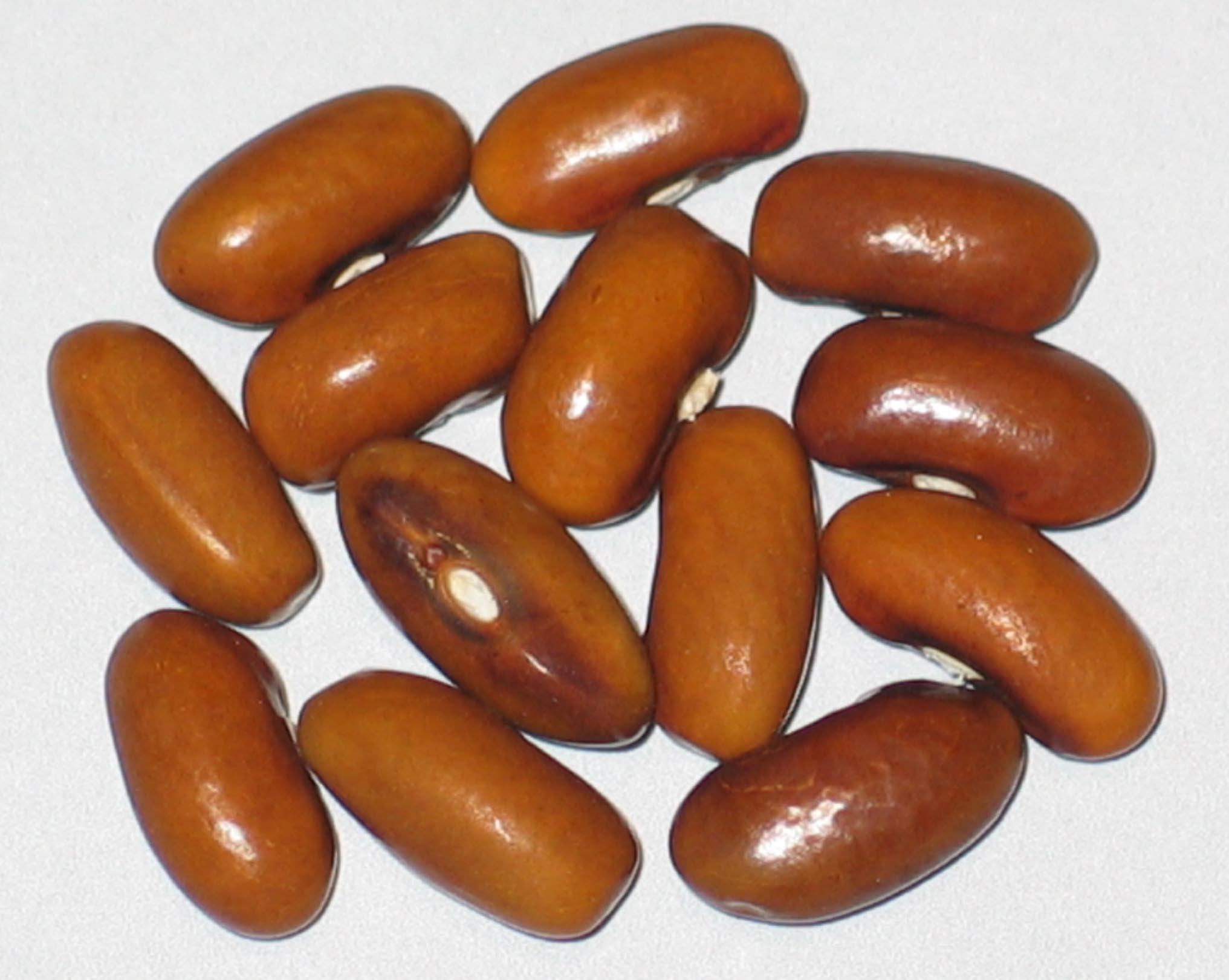
Brown Kidney
Packet Size 30 Seeds $5.00
Brown Kidney is a bush dry bean variety that grows without runners and features round green pods reminiscent of snap pods. This variety produces its first dry pods in about 80 days and was part of the renowned Wanigan bean collection curated by John Withee. Acquired in 1978, the Brown Kidney bean served as the seed mother for one of my original beans named Pawnee, which was developed in 1979, highlighting its significance in my bean cultivation journey.
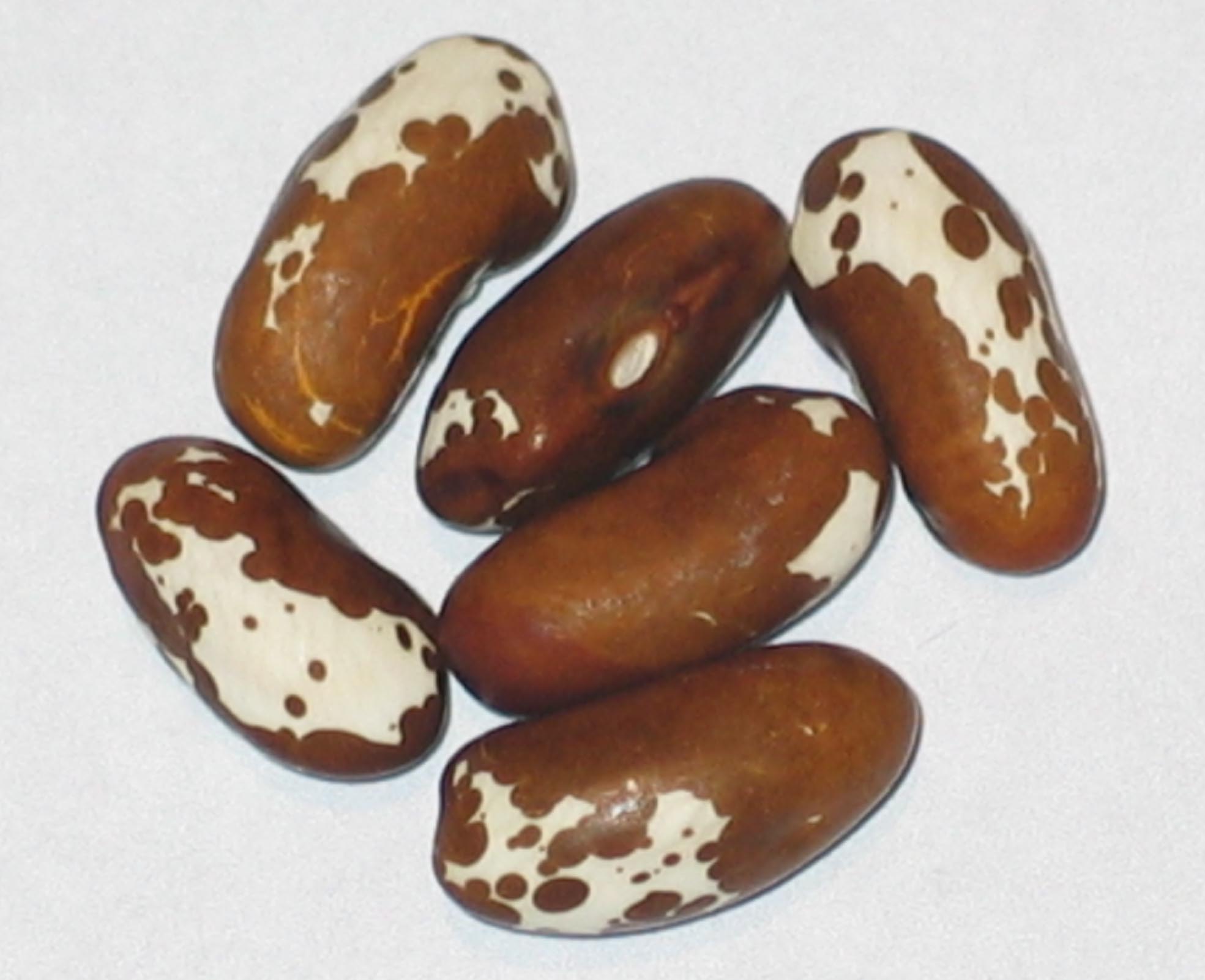
Brown Trout
SOLD OUT
Bush dry bean variety with light pink blossoms and early maturity of about 80 days. Its seed coat features a color pattern similar to Jacob's Cattle but in shades of brown and white. The ratio of white to brown varying based on seasonal conditions such as weather or soil type. A notable seed crop grown during the exceptionally hot and dry summer of 2012 resulted in a typical seed makeup that was about 99.5% brown. This unique bean variety was originally named by former Seed Savers Exchange member the late Ernest B. Dana of Etna, N.H., who gifted this bean to me in 1980 due to his passion for beans with the Jacob's Cattle seed coat pattern.
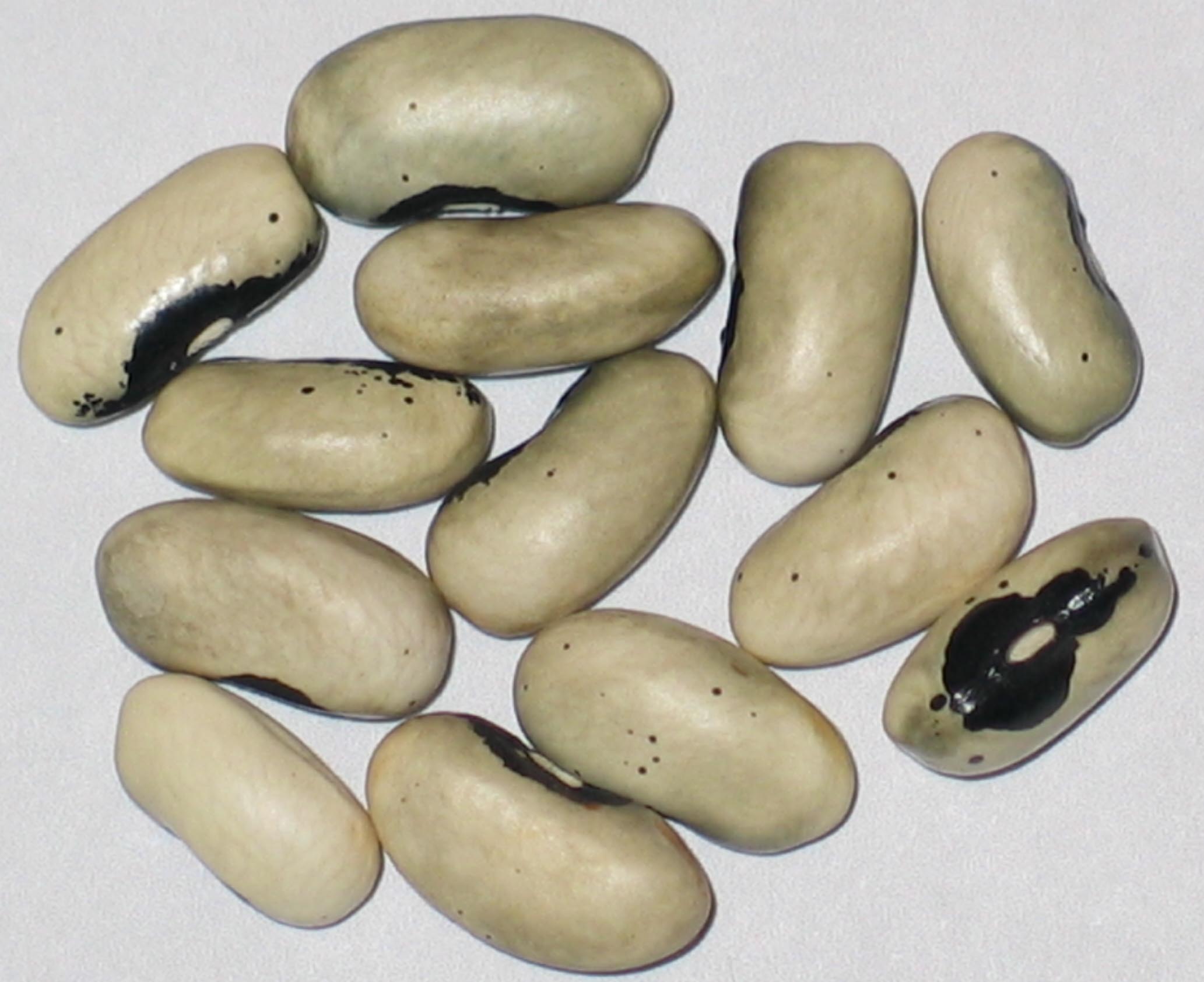
Buckskin Girl
Packet Size 25 Seeds $5.00
Buckskin Girl is a bush/snap bean variety that is considered endangered, yet it has been commercially available from two seed companies. This variety produces stringless green pods within 48 days when grown in northern Illinois and takes about 90 days to yield its first dry pods. The plant features white blossoms and growing to a height of 16 to 18 inches, bearing 6-inch green pods that are known for their delicate, sweet flavor. A steam cooking test conducted on July 26, 2020, further highlighted the bean's culinary qualities, showcasing its appeal for gardeners and chefs alike.
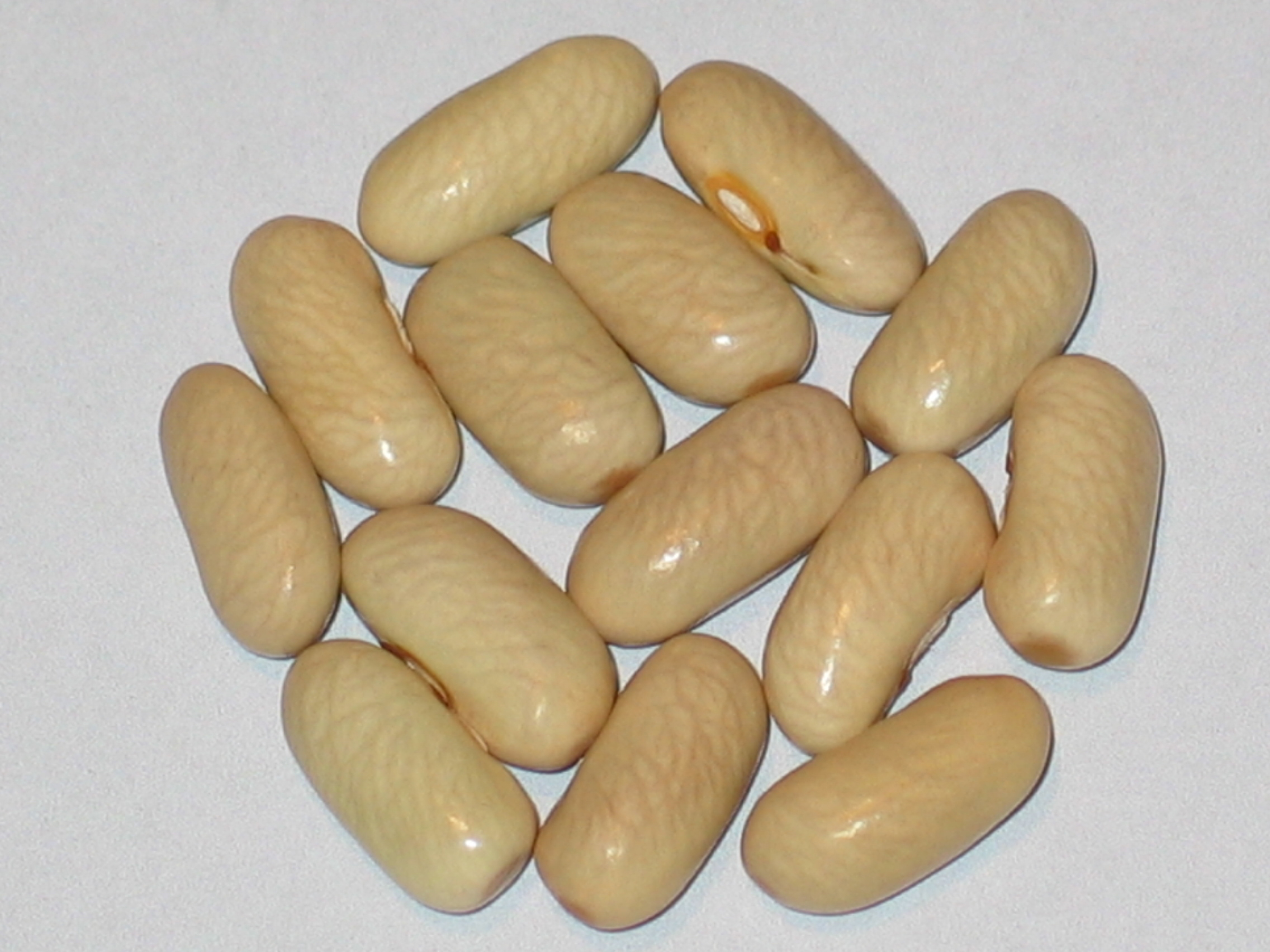
Buffy
Packet Size 25 Seeds $5.00
Buffy is a bush snap bean variety with green pods that I discovered in my garden and named in 1979. It likely originated from a cross between Contender and Cherokee Wax, though its seed color appears to have reverted closer to that of Contender, suggesting that its genetic makeup likely differs. Buffy is known for its high productivity, and when grown in many summers since, it has exhibited excellent flavor, tenderness, and a stringless quality. This variety is also sold by the Secret Seed Cartel in France, indicating its broader appeal among gardeners.
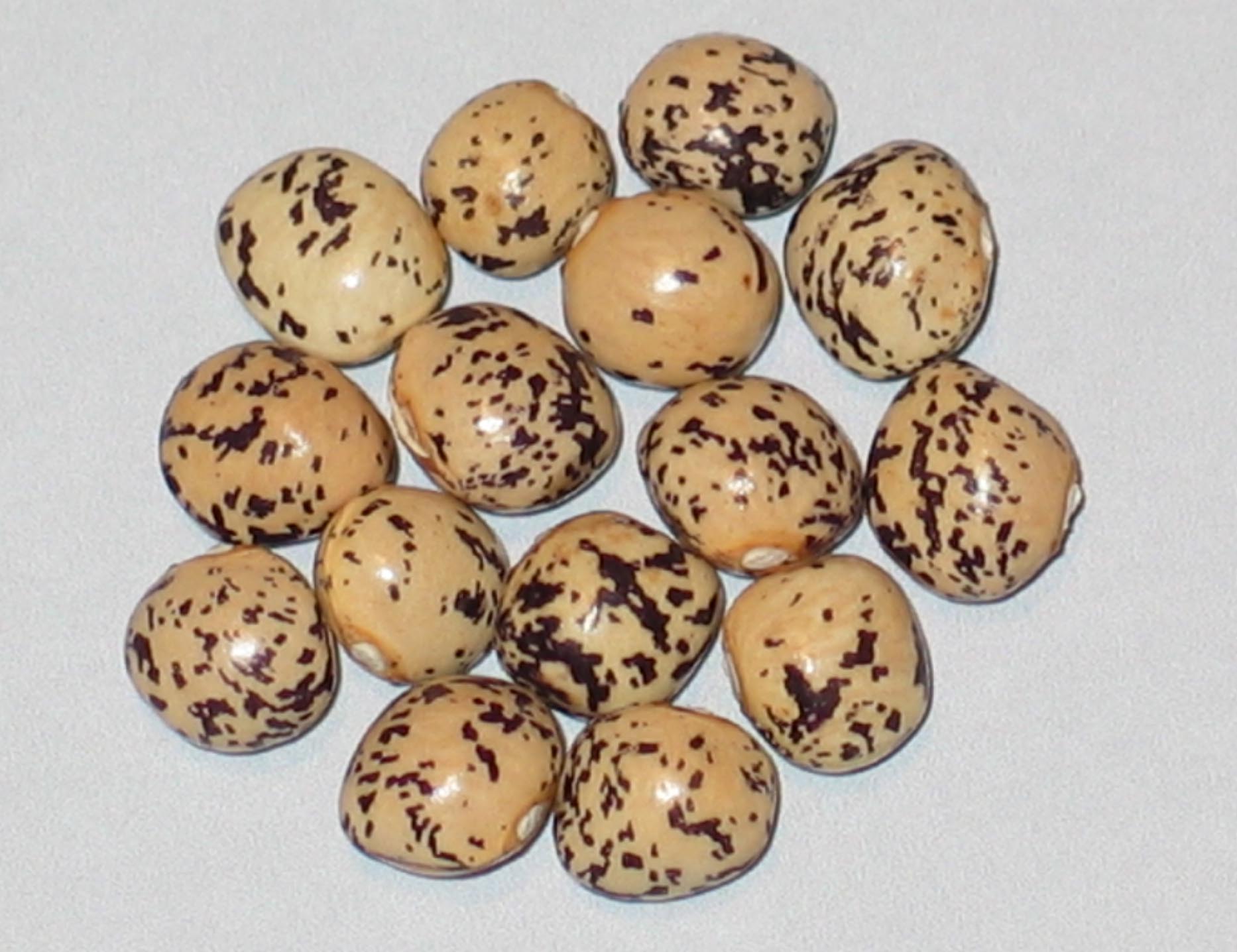
Buxton Buckshot
SOLD OUT
Pole/Dry. Buxton Buckshot is an heirloom dry bean variety from Buxton, Maine, taking over 110 days to produce dry pods. This plant can climb to about 4 feet and features round green pods adorned with purple streaks. Once in the dry stage, the pods display distinct rounded lumps where the seeds have formed, which are small, round, and slightly smaller than navy beans. Known for being a fun variety to grow, Buxton Buckshot offers a unique gardening experience with its interesting pod characteristics and heirloom lineage.
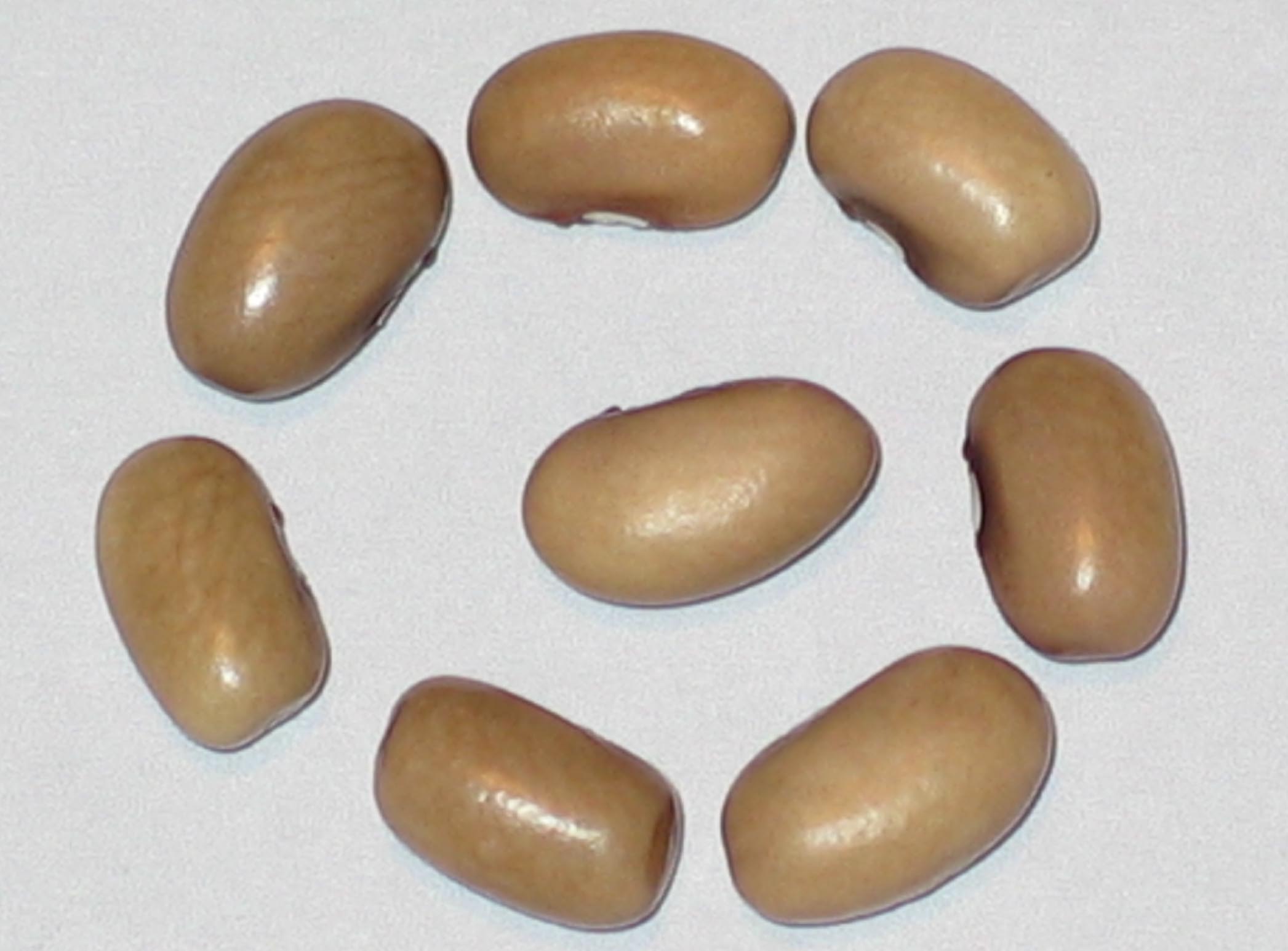
California
Packet Size 35 Seeds $5.00
Semi-Runner/Dry. Obtained this tan bean in 1979 mixed into a packet of Zebra which I had gotten from John Withee's Wanigan Associates bean network. John told me his Zebra bean was sent by a grower in California. So I seperated these solid tan beans, and grew them seperately. Since the bean had grown true for several years I gave it the name California. After three years of grow outs I had then sent Mr. Withee a sample of this bean. This bean is also today in the bean collections of the Seed Savers Exchange's Heritage Farm In Decorah, Iowa.
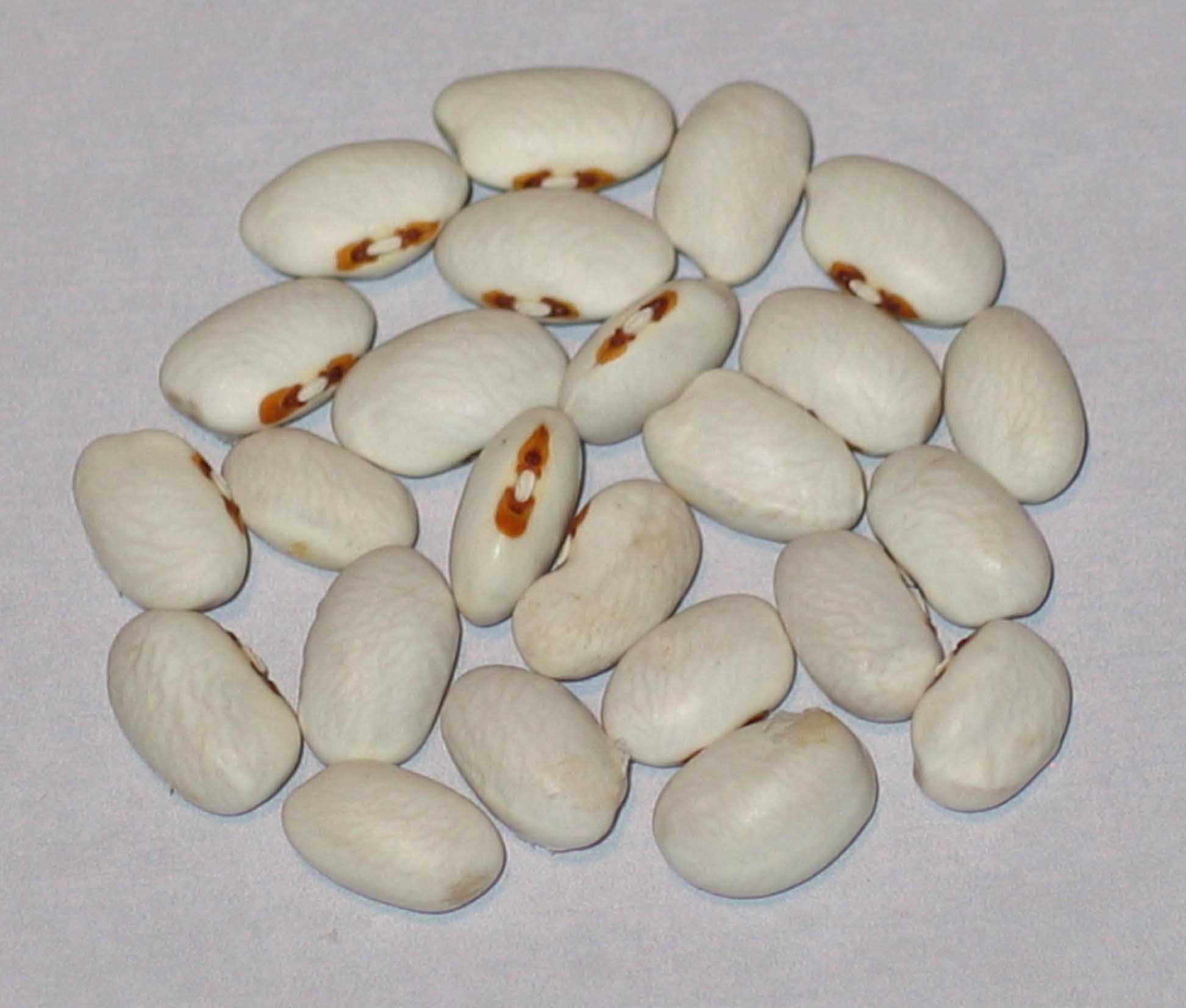
Canadian Dot Eye
Packet Size 25 Seeds $5.00
Canadian Dot Eye is a bush dry bean variety that typically produces its first dry pods in about 83 days. These compact plants reach heights of 12 to 14 inches and belong to the yellow eye type category. Likely of Canadian origin.
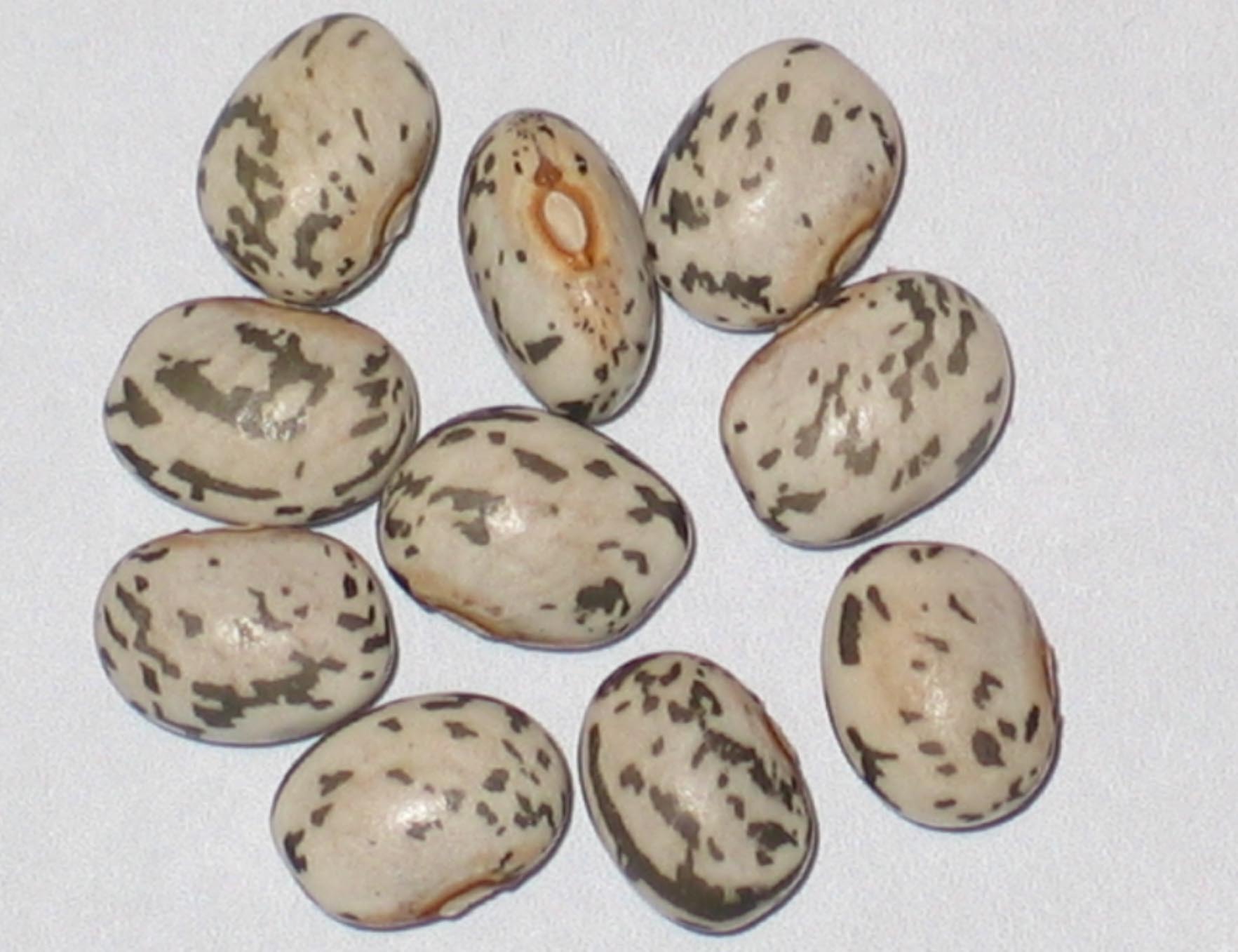
Canadian Wild Goose
Packet Size 40 Seeds $5.00
Semi Runner/Dry. First dry pods begin in about 90 days. Pod walls become very thin upon drying. Easy to shell. Low growing viney plant that throws off short twiners. Plants produce many small short green pods with purple stripping. Productive in a good growing season. It's name would suggest a Candian origin. I first encountered this bean in 1978 when I joined John Withee's Wanigan Associates bean network.
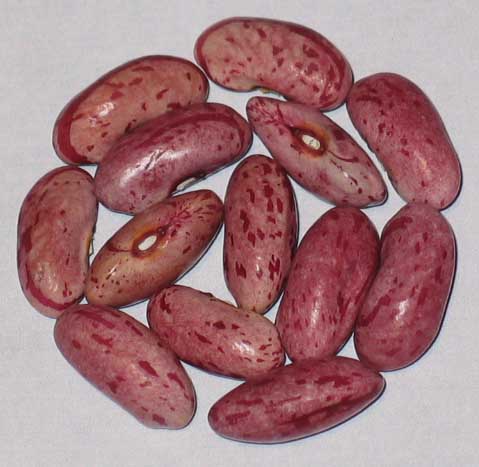
Candy
Packet Size 18 Seeds $5.00
Candy is a semi-runner variety with a dry maturity time of 106 days, featuring large seeds. Discovered in my garden in 1982 and named by me, Candy has since captured the admiration of gardeners worldwide. It is offered by two Canadian seed companies and is preserved in the Seed Savers Exchange collection as SSE Bean 2764, as well as by the USDA in it's cranberry category under the number PI642162. This stunning bean is a descendant of the Big Light Red Trout and has become a favorite among gardening enthusiasts for its charm and appeal.
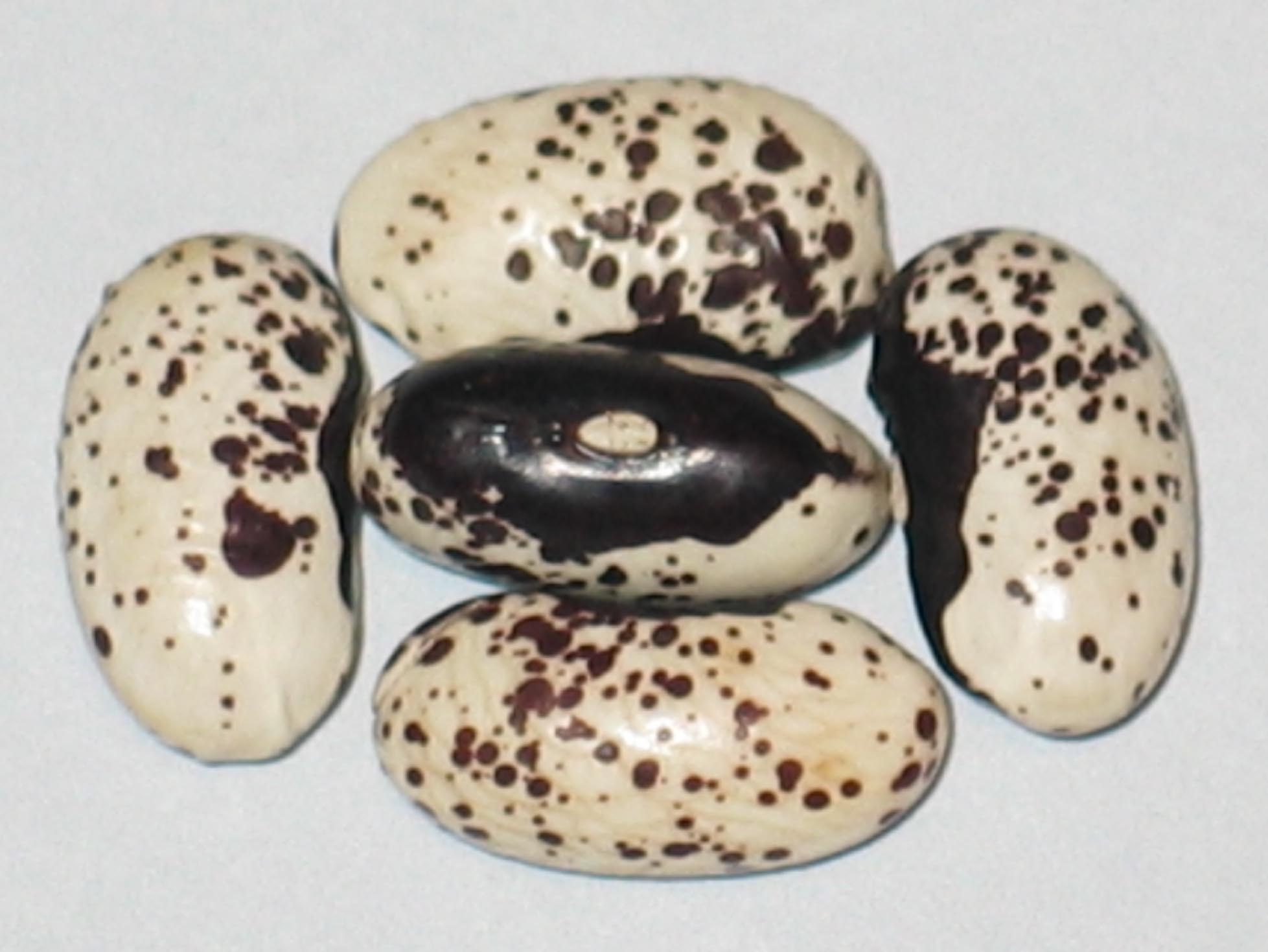
Cannellino Nero
Packet Size 25 Seed $5.00
Cannellino Nero is a bush dry variety of Italian heritage, distinguished by its non-running growth habit and lovely pink blossoms. These productive plants reach a height of approximately 20 inches and yield their first dry five-inch pods in about 100 days, with nearly all dry pods ready for harvest by around 120 days. Sourced from the esteemed collection of renowned Italian bean grower Domenico Belisario, Cannellino Nero is a delightful addition to any garden.
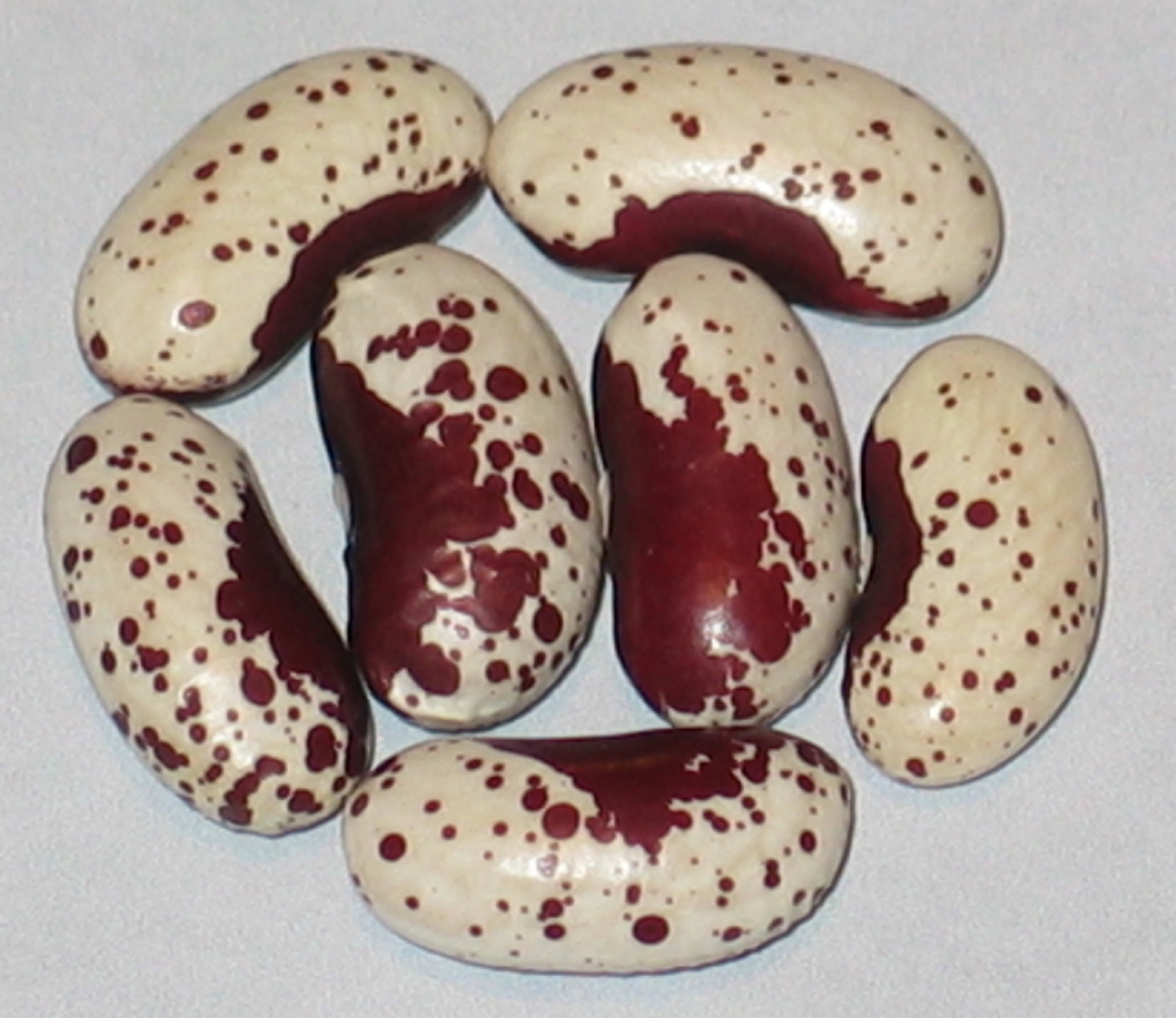
Cannellino Rosso
Packet Size 25 Seeds $5.00
Bush/Dry. Cannellino Roso is the vibrant red counterpart to Cannellino Nero, sharing a similar growth habit and maturation timeline. This Italian bean variety, renowned for its striking color, is also part of the esteemed collection of well-known Italian bean grower Domenico Belisario, making it a valuable addition for gardeners seeking to diversify their harvest with both visual appeal and robust flavor.
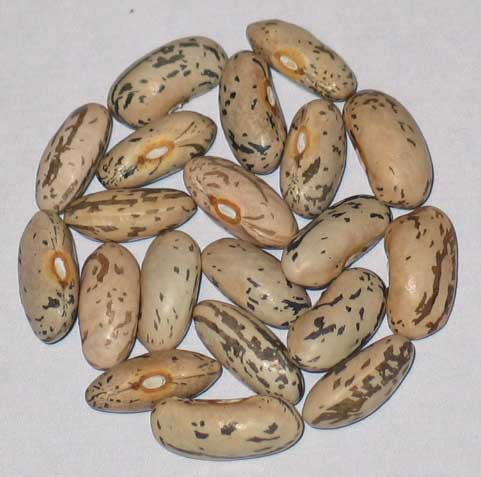
Cascade Giant
Packet Size 30 Seeds $5.00
Cascade Giant is a pole snap bean known for its attractive green stringless pods streaked with purple. This variety, developed at Oregon State University as an enhancement over the Oregon Giant, offers pickable pods in about 70 days. Released in 1992, Cascade Giant combines visual appeal with excellent flavor and productivity, making it a popular choice for gardeners and chefs alike.
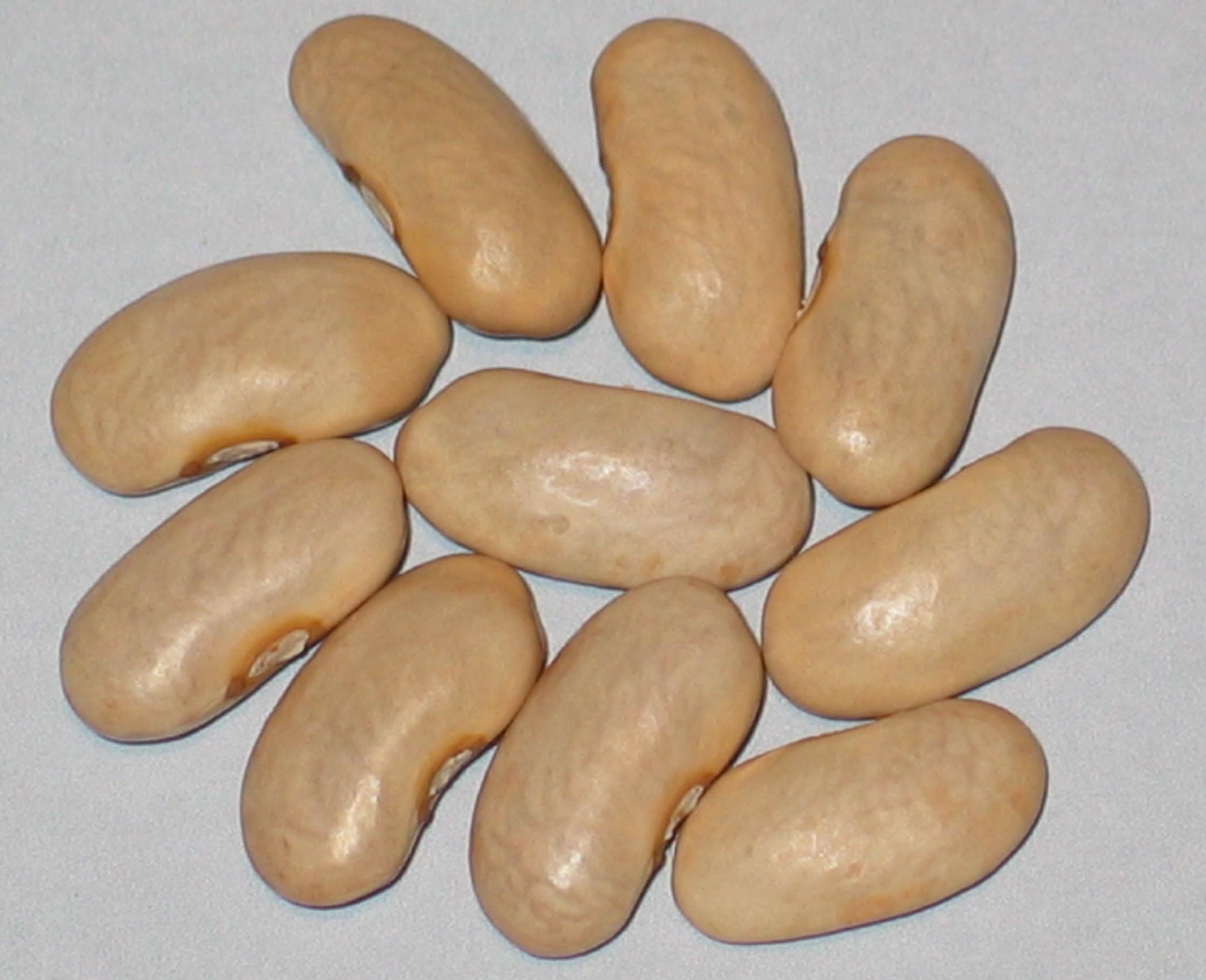
Cassie's Purple Pod
Packet Size 25 Seeds $5.00
Cassie's Purple Pod is a pole snap bean celebrated for its impressive growth and striking appearance. This medium-strong climber produces tender, stringless purple pods that can reach lengths of up to 8 inches (20 cm) and deliver rich flavor. Interestingly, once cooked, the pods transform into a dark green color. This variety has a legacy among members of the Seed Savers Exchange in the U.S., with its cultivation and trading dating back to the early 1980s, reflecting a dedication to preserving heirloom seeds.
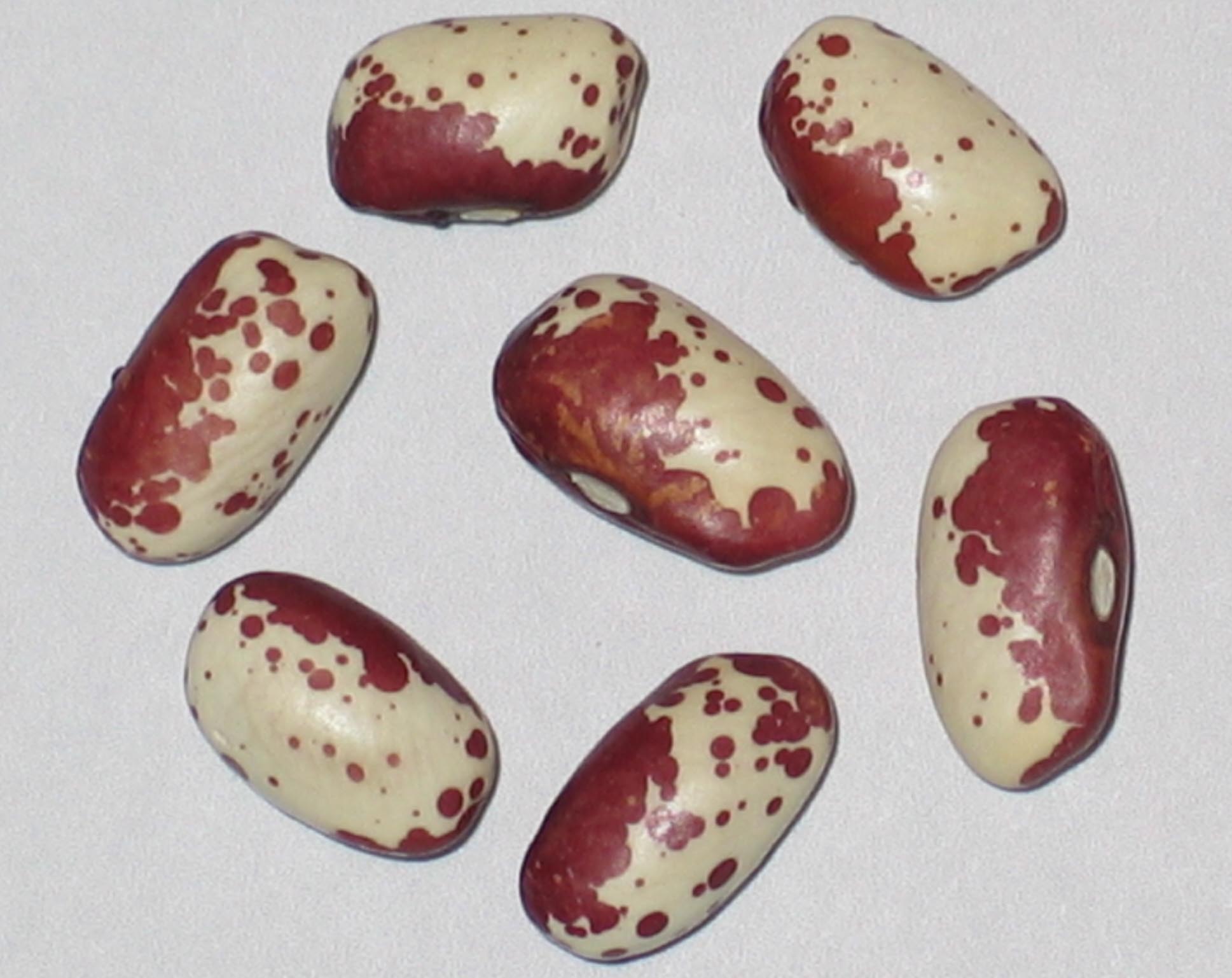
Cedar Lake
Packet Size 30 Seeds $5.00
Bush/Dry. 80 days. Productive and early. Medium sized seed. One of the many original named bean varieties introduced by the late Robert Lobitz through the Seeds Savers Exchange yearbook.

Champagne
Packet Size 25 Seeds $5.00
Champagne is a vigorous pole snap bean known for its productivity and 8-inch flat green stringless pods, which are ready for harvest in about 70 days. This variety has a rich history, originally given to J.R. Hepler by Ernie Champagne in New Hampshire during the 1940s. J.R. Hepler's son Billy, who later founded the Billy Hepler Seed Company at just 12 years old, first introduced Champagne in his seed catalog in 1952, making it a cherished heirloom variety among gardeners.
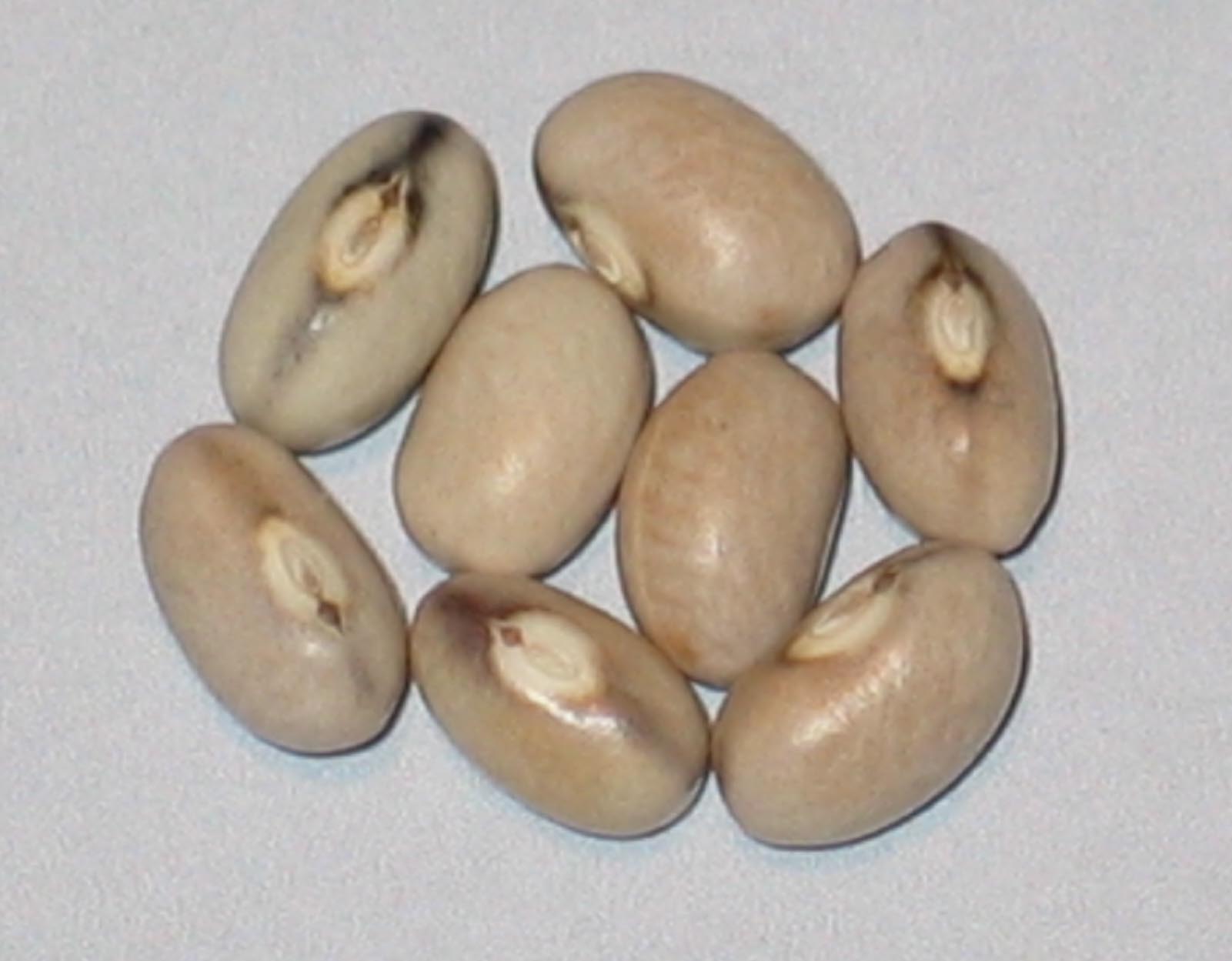
Charlie Tinker's Grey Ball
SOLD OUT
Charlie Tinker's Grey Ball is a productive bush dry bean variety hailing from the U.S.A. Recognized for its adaptability and yield, this variety adds value to home gardens and agriculture alike. It was part of the diverse bean collection that had been curated in past years by Joseph Simcox, known as The Botanical Explorer, highlighting his legacy in preserving heirloom varieties.
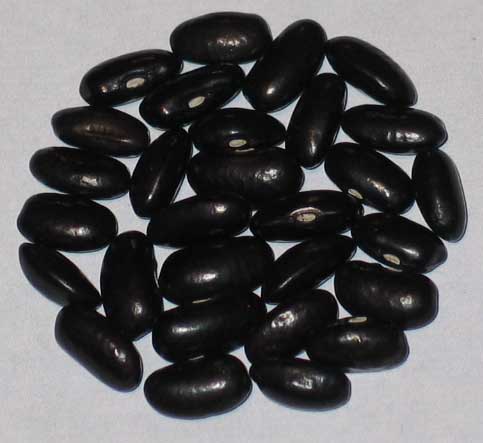
Cherokee Trail Of Tears
Packet Size 30 Seeds $5.00
Cherokee Trail Of Tears, also referred to as Cherokee Black, is a pole dry bean This variety carries profound historical significance, as it was transported by Cherokee ancestors during the harrowing Trail of Tears, a tragic forced relocation from the Smoky Mountains to Oklahoma, which resulted in the loss of approximately 4,000 lives. The bean serves as a poignant reminder of resilience and cultural heritage. Copy H
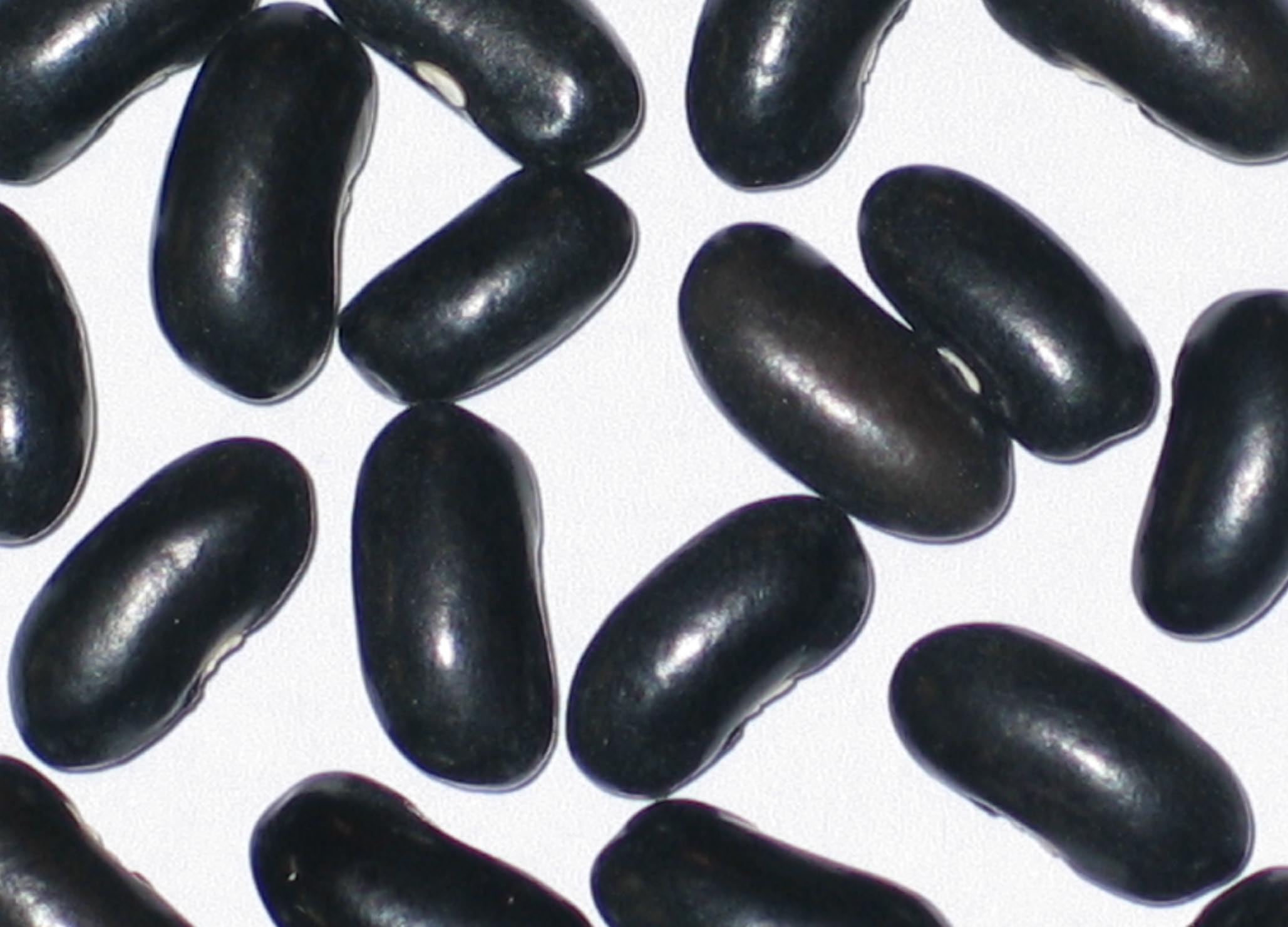
Cherokee Wax
Packet Size 35 Seeds $5.00
Cherokee Wax is a bush snap bean known for its impressive productivity and resilience, thriving in adverse weather conditions. It features stringless, 5 to 7-inch yellow pods and reaches snap stage in 45 to 55 days, with the first dry seeds ready in about 90 days. Standing at 18 inches tall, this variety is a mutation of the Asgrow Valentine and was developed at the Clemson College Truck Experiment Station in Charleston, South Carolina, with its original vendor being the Asgrow Seed Company in 1947.
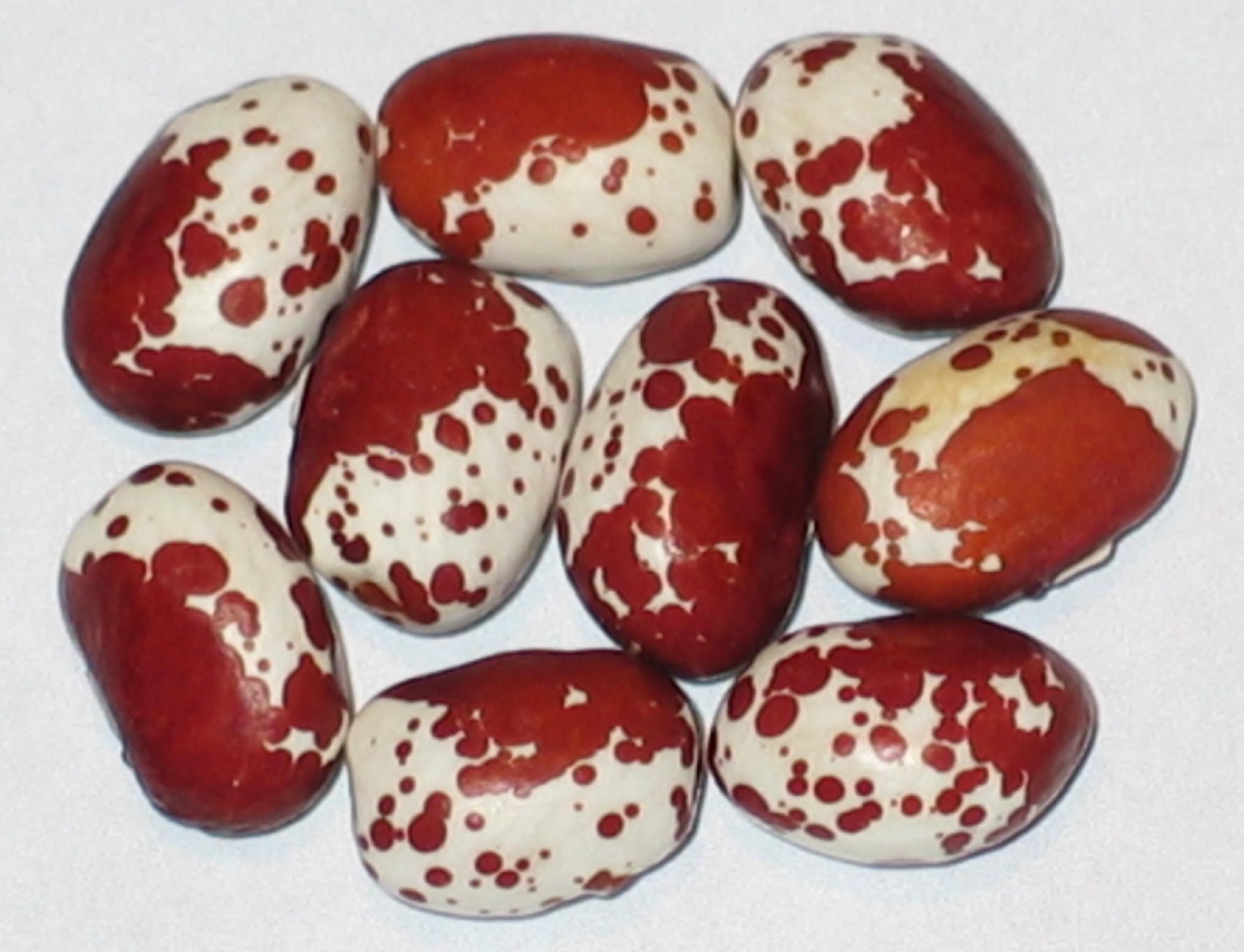
Cherry Trout
Packet Size 25 Seeds $5.00
Bush/Dry. Cherry Trout is a unique bean variety that takes 82 days to produce its first dry pods. Discovered in my bean garden and named by me in 1983, it features a distinctive seed coat patterned similar to Jacob's Cattle, but with a smaller red area around the eye and fewer, smaller red spots on a white background. The seeds are also shorter and plumper, making this variety a notable addition for gardeners seeking diversity in their collections.
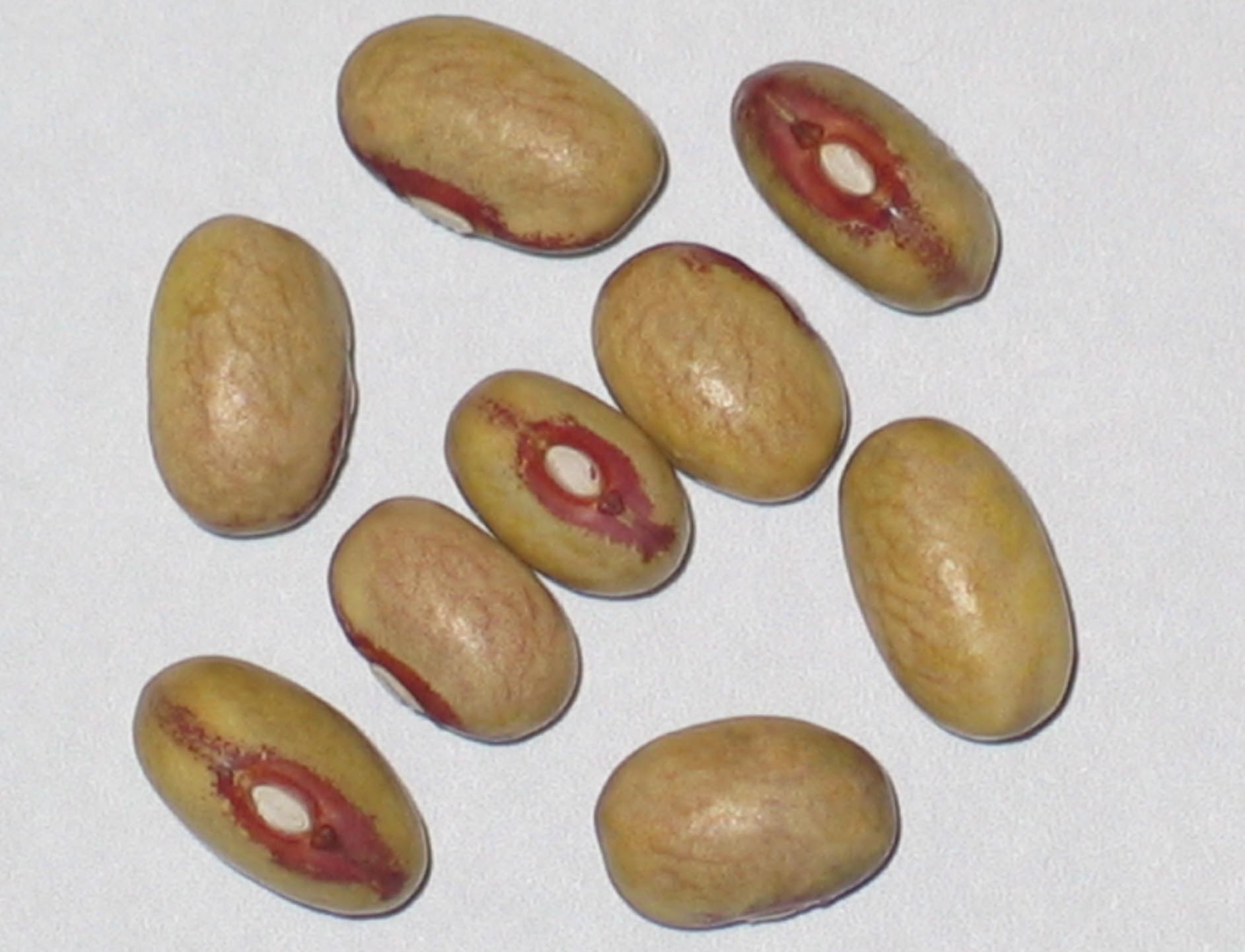
Chickasaw
Packet Size 35 Seeds $5.00
Chickasaw is a semi-runner dry bean variety with pods reaching up to 4.75 inches, maturing to dry sequentially in about 90 days. This stable outcross was discovered and named in 1979 from a grow-out of the round, yellow-seeded bush bean “Sulphur,” obtained from John Withee's Wanigan Associates in 1978. Following a second grow-out, it also generated another original bean I named Choctaw. Chickasaw was listed in the SSE winter yearbook in 1982, highlighting its significance in the heirloom bean community.
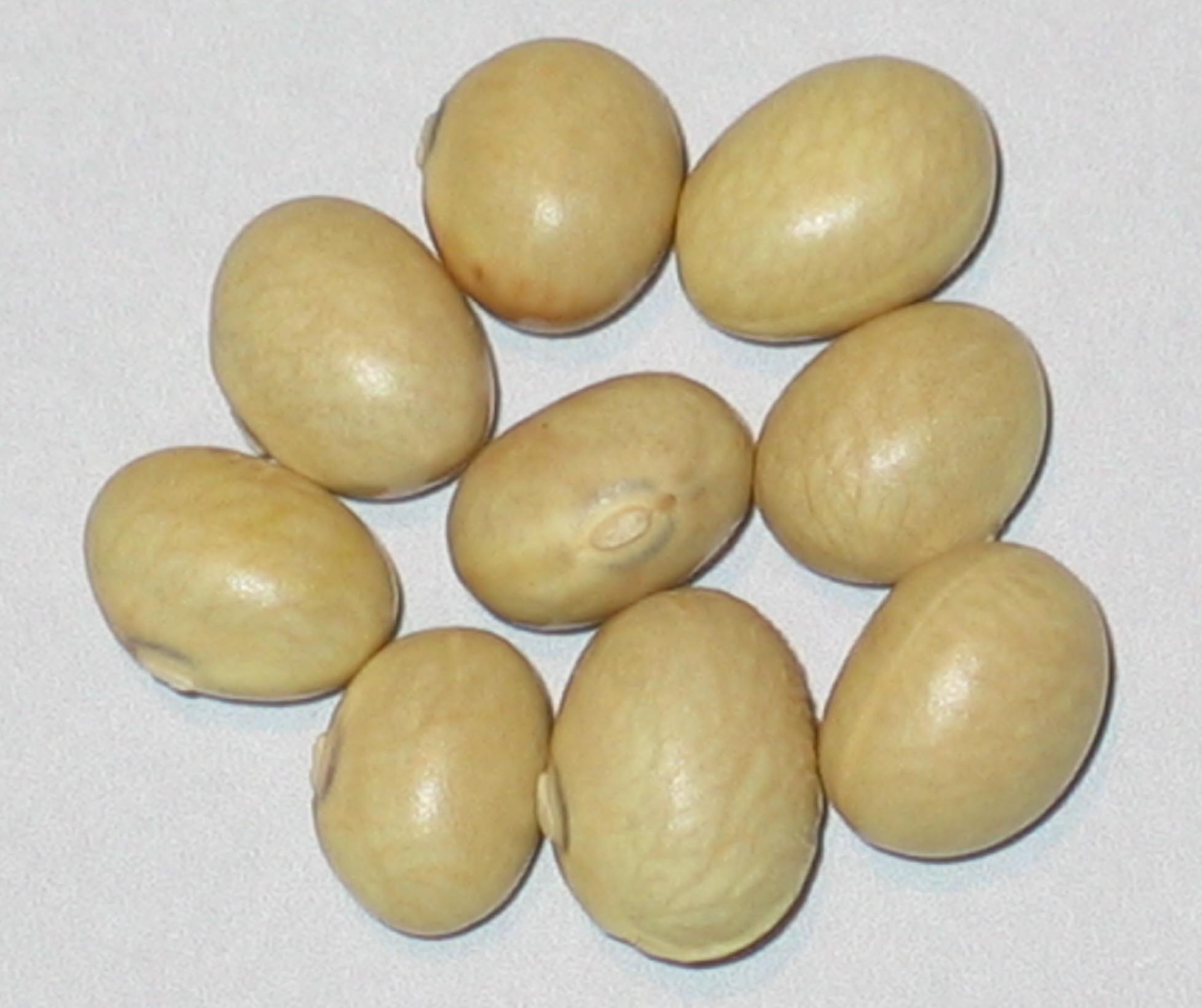
China Yellow
Packet Size 35 Seeds $5.00
Bush/Dry. China Yellow, also known as Sulphur bean, is a bush dry bean variety that was featured in John Withee's Wanigan catalog in the late 1970s. This New England heirloom variety traces its origins back to before 1870 and is characterized by its larger seeds compared to Navy beans along with a distinctive flavor. Once cherished in various countries, China Yellow comes in many strains, reflecting its rich agricultural history and diversity.
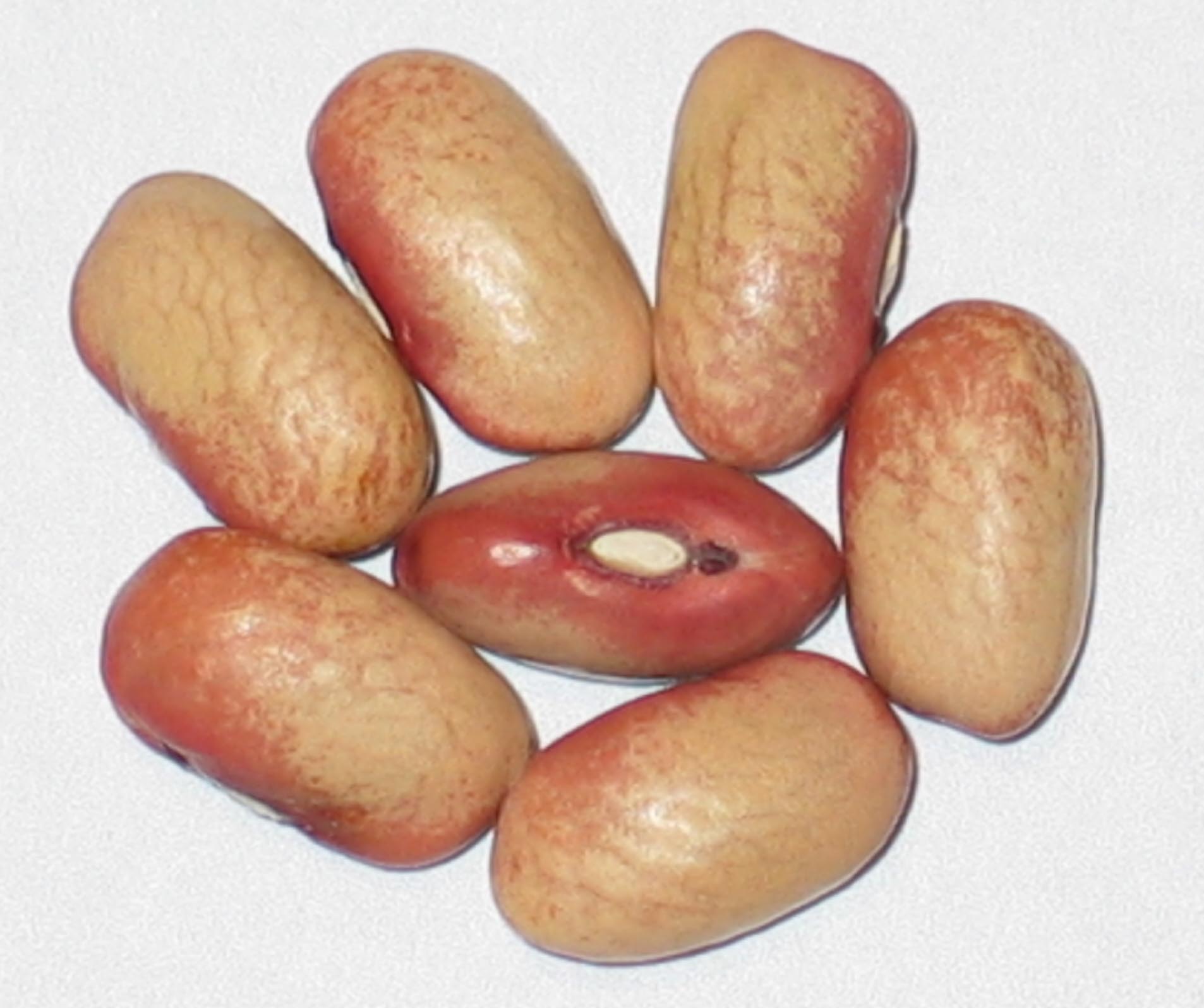
Choctaw
Packet Size 30 Seeds $5.00
Choctaw is a semi-runner dry bean variety and a genetic relative of the Chickasaw bean. Discovered and named by me in my Capron, Illinois garden in 1979, Choctaw exhibited a distinct appearance that became evident during that growing season alongside Chickasaw. After losing track of the bean, I reacquired it in 2013 from John Staples, a former SSE member who had preserved a freezer sample since 2006. Choctaw was first listed in the 1982 SSE winter yearbook, marking its significance in the world of heirloom beans.
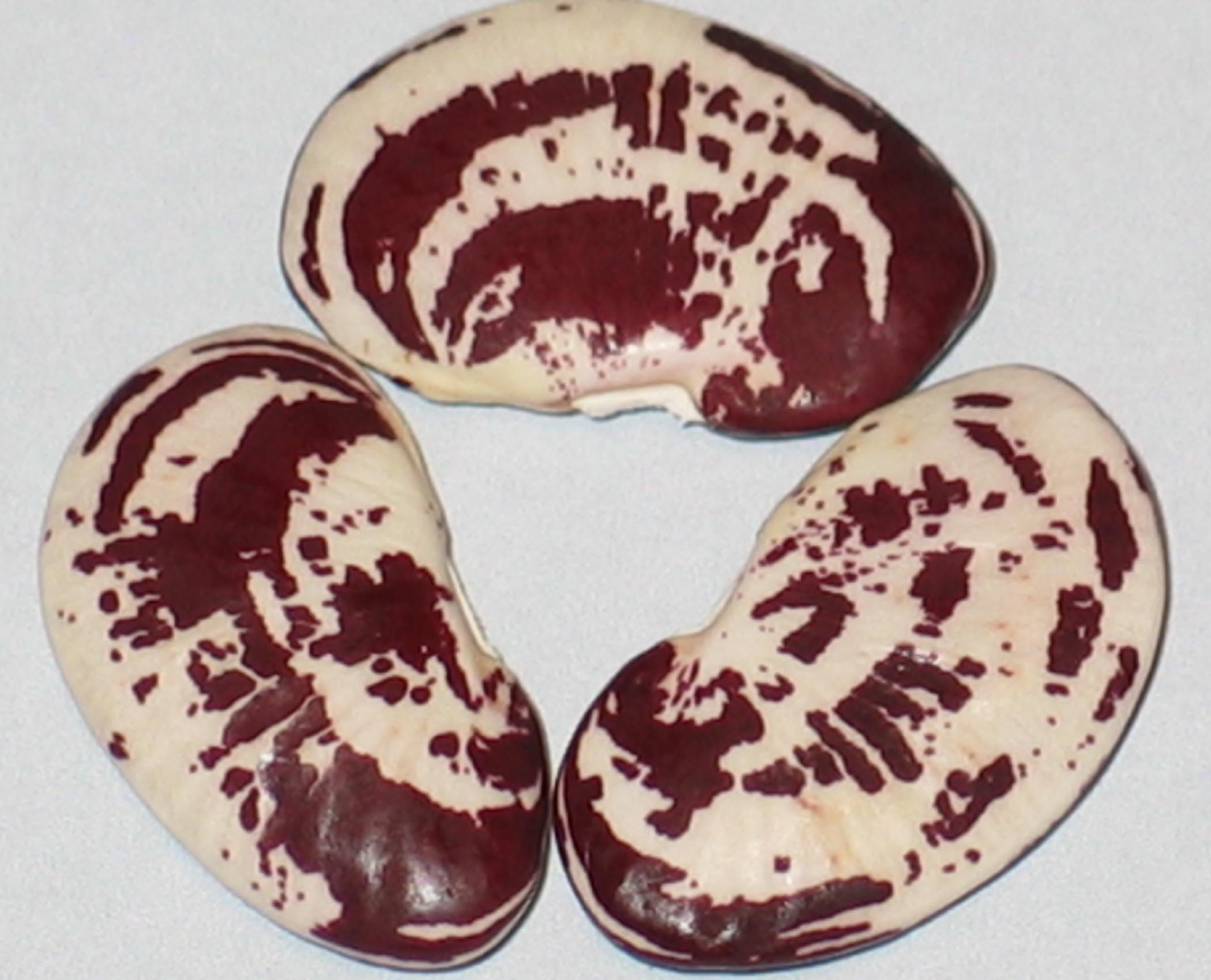
Christmas
Packet Size 12 Seeds $5.00
Christmas is a pole large-seeded pole Lima bean known for its productive yield, although it is slightly late in producing dry seeds, even in a zone 5 climate. Dating back to the 1840s, this heirloom variety was particularly popular in the Southwest and is well-regarded for its tolerance to high heat, making it a resilient choice for gardeners in warmer regions.
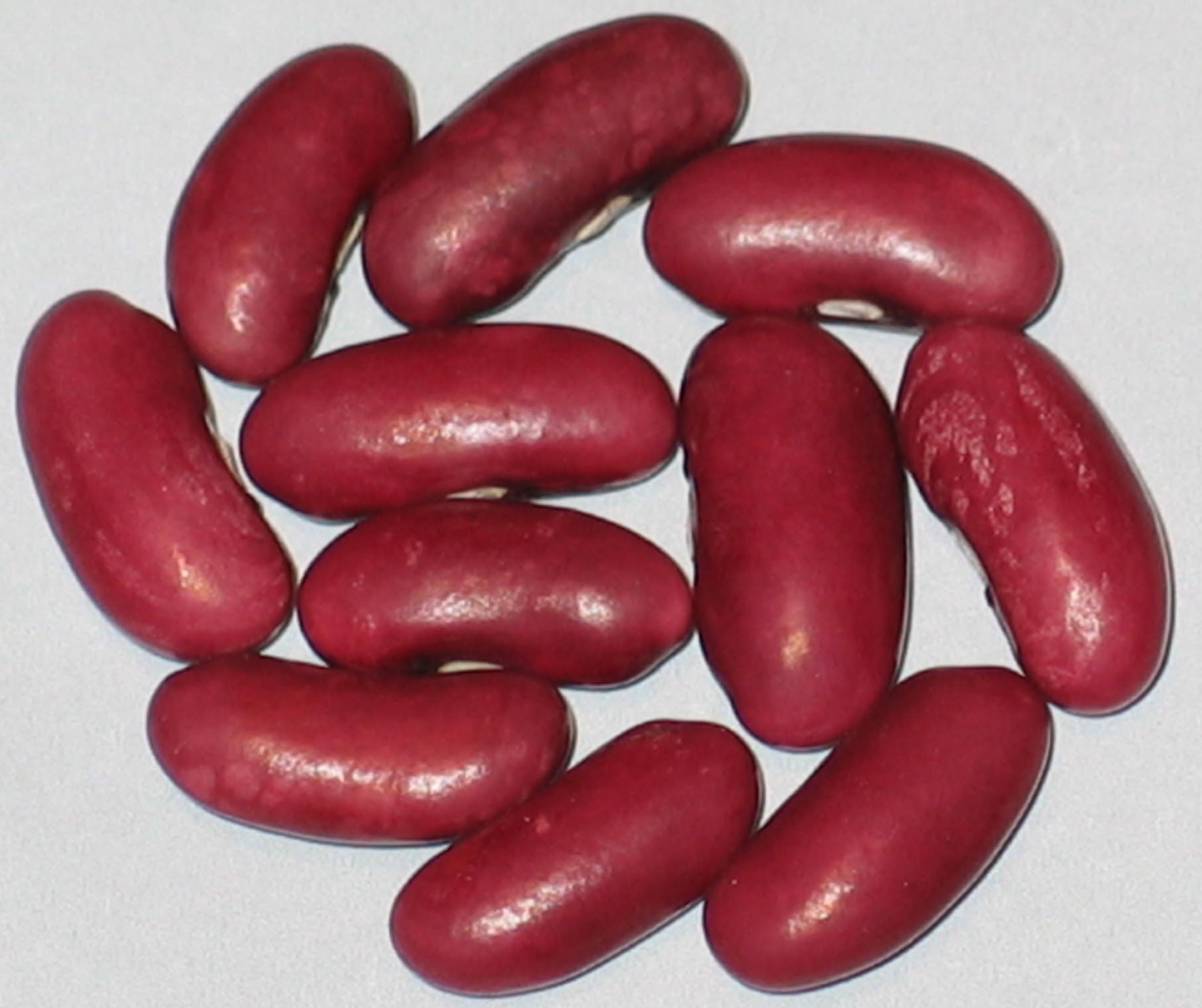
Clarendon Wonder
Packet size 25 Seeds $5.00
Clarendon Wonder is a bush snap bean variety that grows without runners, making it easy to harvest and manage in the garden. This Australian variety was developed in 1945 by Mr. Neville Shirlaw at the Hawkesbury Agricultural College in New South Wales. Known for its crisp, tender pods and excellent flavor, Clarendon Wonder is a prolific producer, making it a favored choice for both home gardeners and commercial growers in suitable climates.
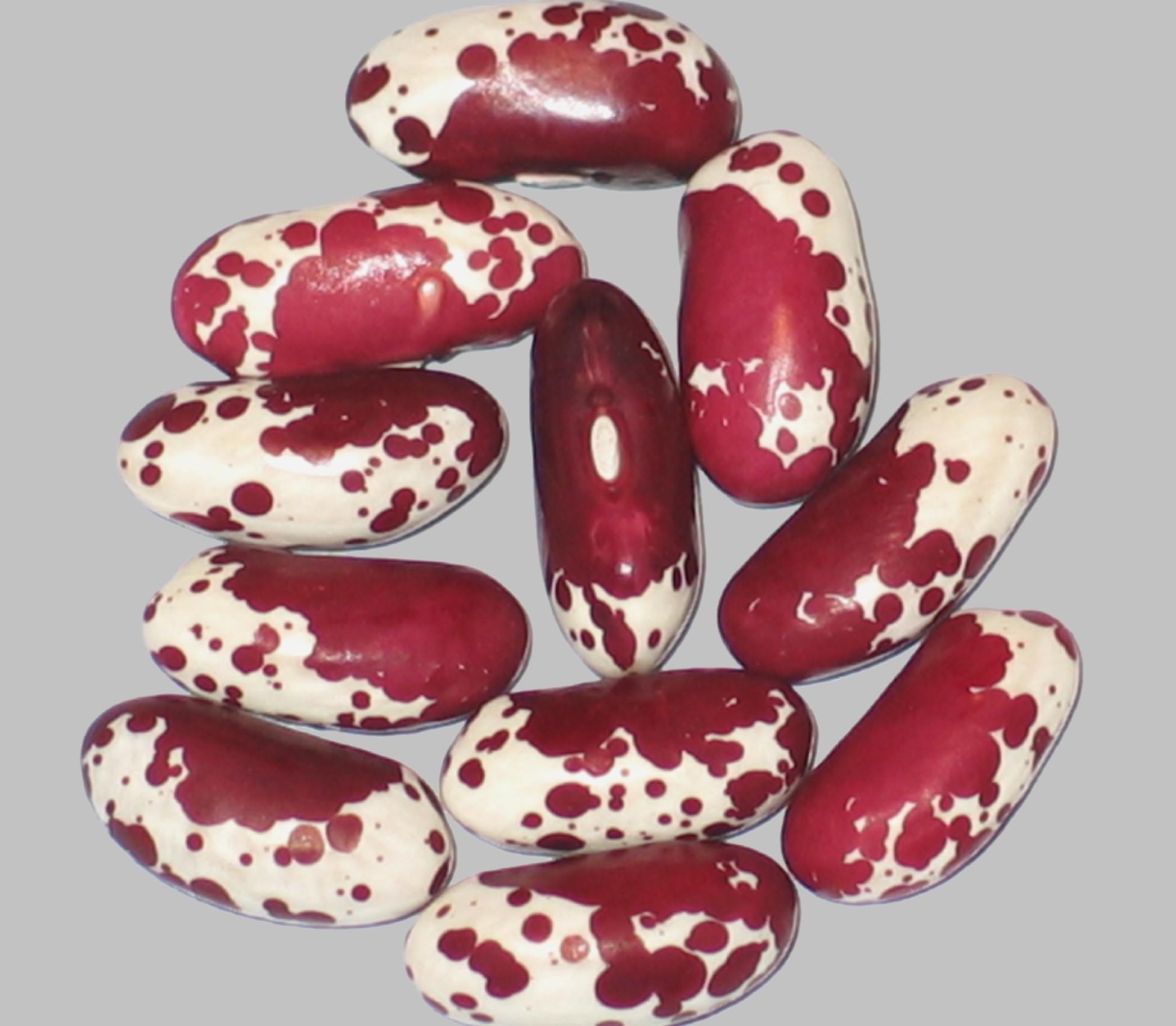
Coach Dog
Packet size 25 Seeds $5.00
Coach Dog is a bush dry bean variety that grows without runners and features distinctive pink blossoms. The plants reach approximately 18 inches in height and are notably productive, maturing their first dry pods in about 80 days. The seeds resemble Jacob's Cattle beans but maintain their characteristic appearance—even in hot summer conditions—whereas Jacob's Cattle beans tend to turn nearly solid red in high temperatures. Coach Dog was historically part of John Withee's Wanigan bean collection from Lynnfield, Massachusetts, highlighting its significance in heirloom bean cultivation.
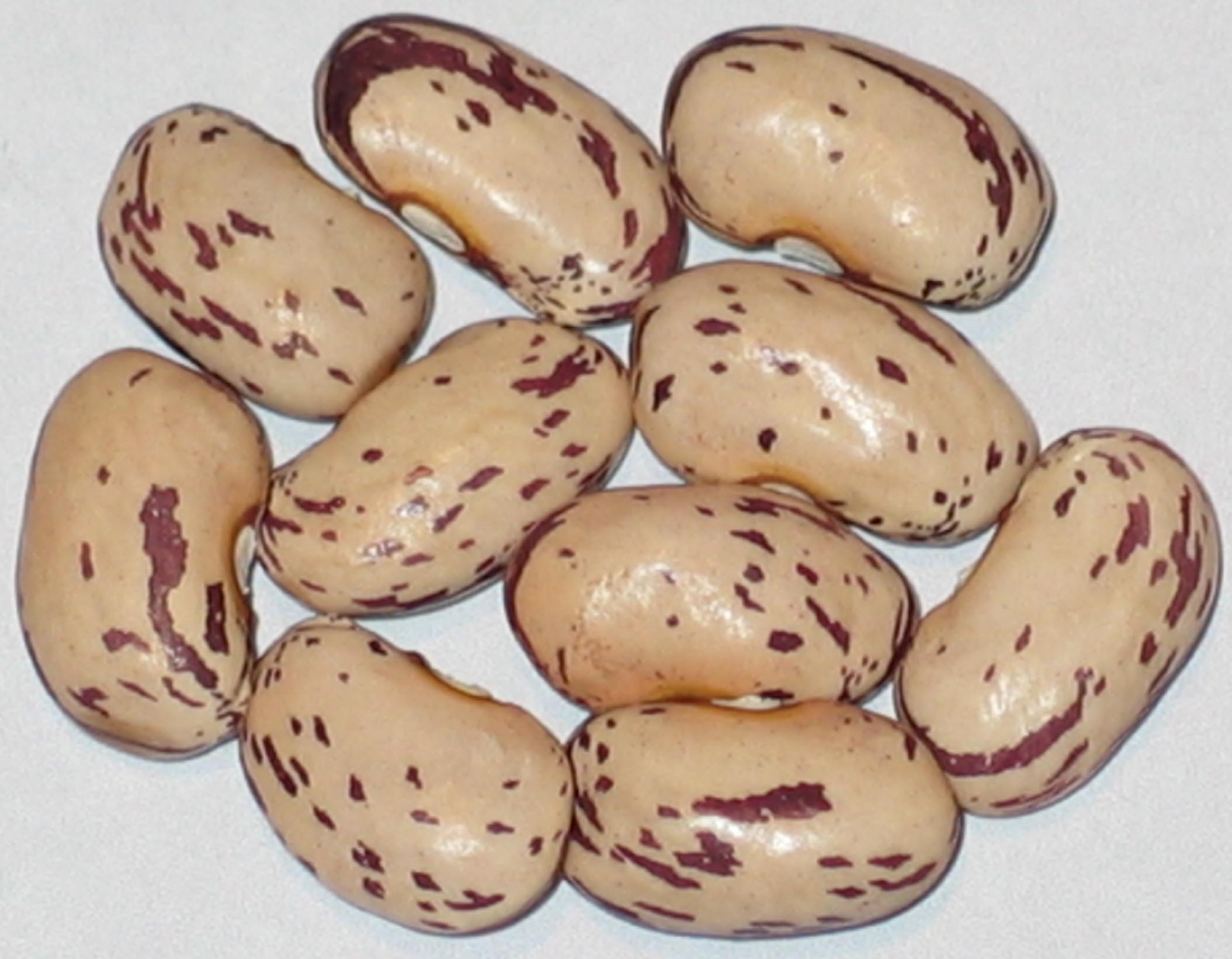
Coco Rubico
Packet Size 25 Seeds $5.00
Coco Rubico is a bush dry bean variety known for its high productivity, capable of producing its first dry pods in as little as 72 days. This bean gained popularity in the 1980s when it was cultivated by enthusiasts, including myself when I procured seeds from Le Jardin Du Gourmet from New Hamphire who in turn imported them from the Vilmorin seedhouse in France. Its early maturation combined with reliable yields makes Coco Rubico a favorable choice for gardeners seeking a swift and rewarding harvest.
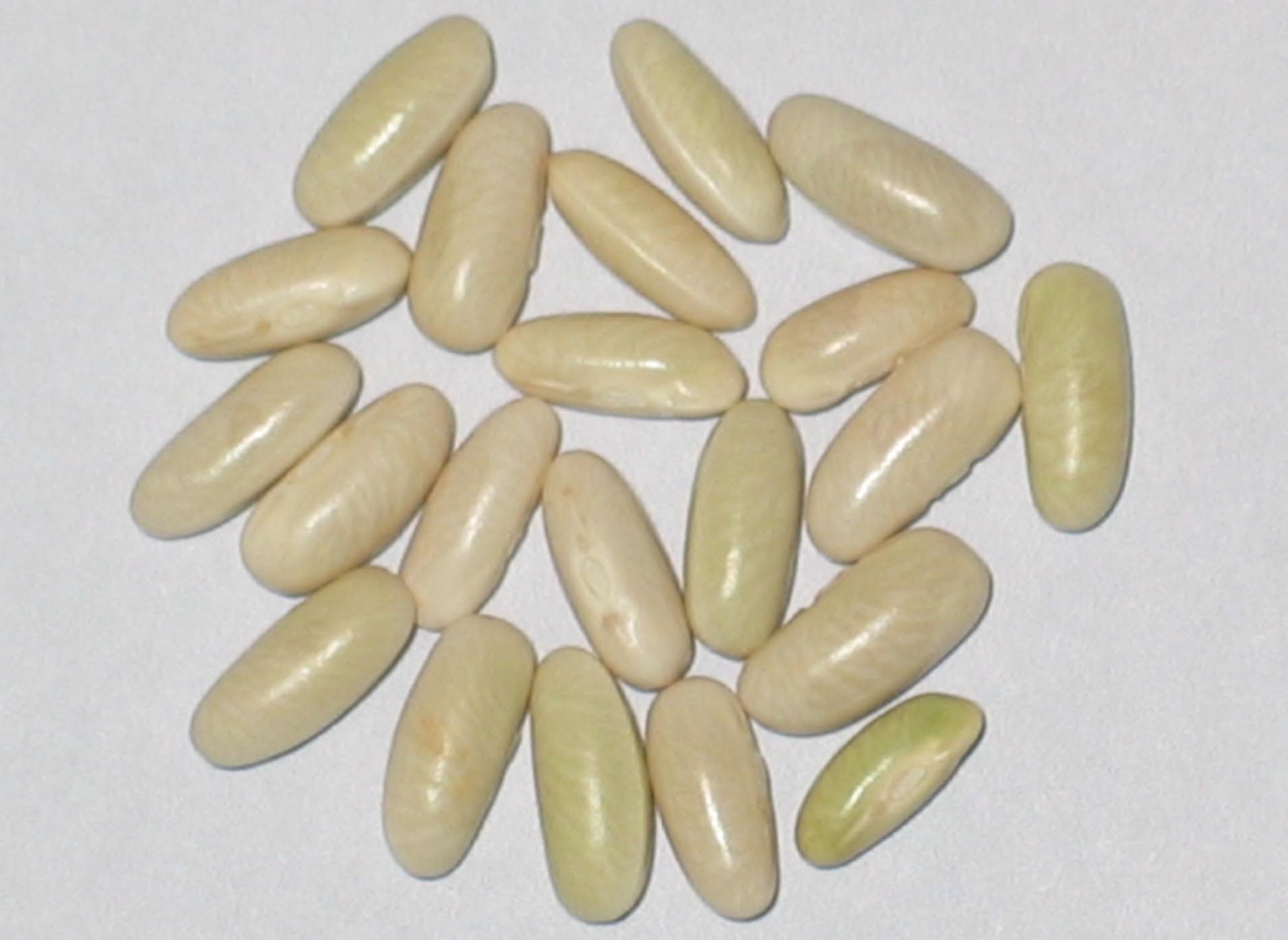
Comtesse de Chambord
Packet Size 50 Seeds $5.00
Comtesse de Chambord is a bush snap bean that is recognized for its early productivity and slender green pods, with origins tracing back to early 19th century France. This particular strain was I acquired in 2012 from Two Wings Farm in British Columbia, Canada. Advertised in their seed catalog as the seed mother for my first original named bean Blue Jay, although there are uncertainties regarding its genetic relationship to the strain remembered from 1977. This heritage adds a layer of historical significance to the bean, linking it to both tradition and personal gardening history.
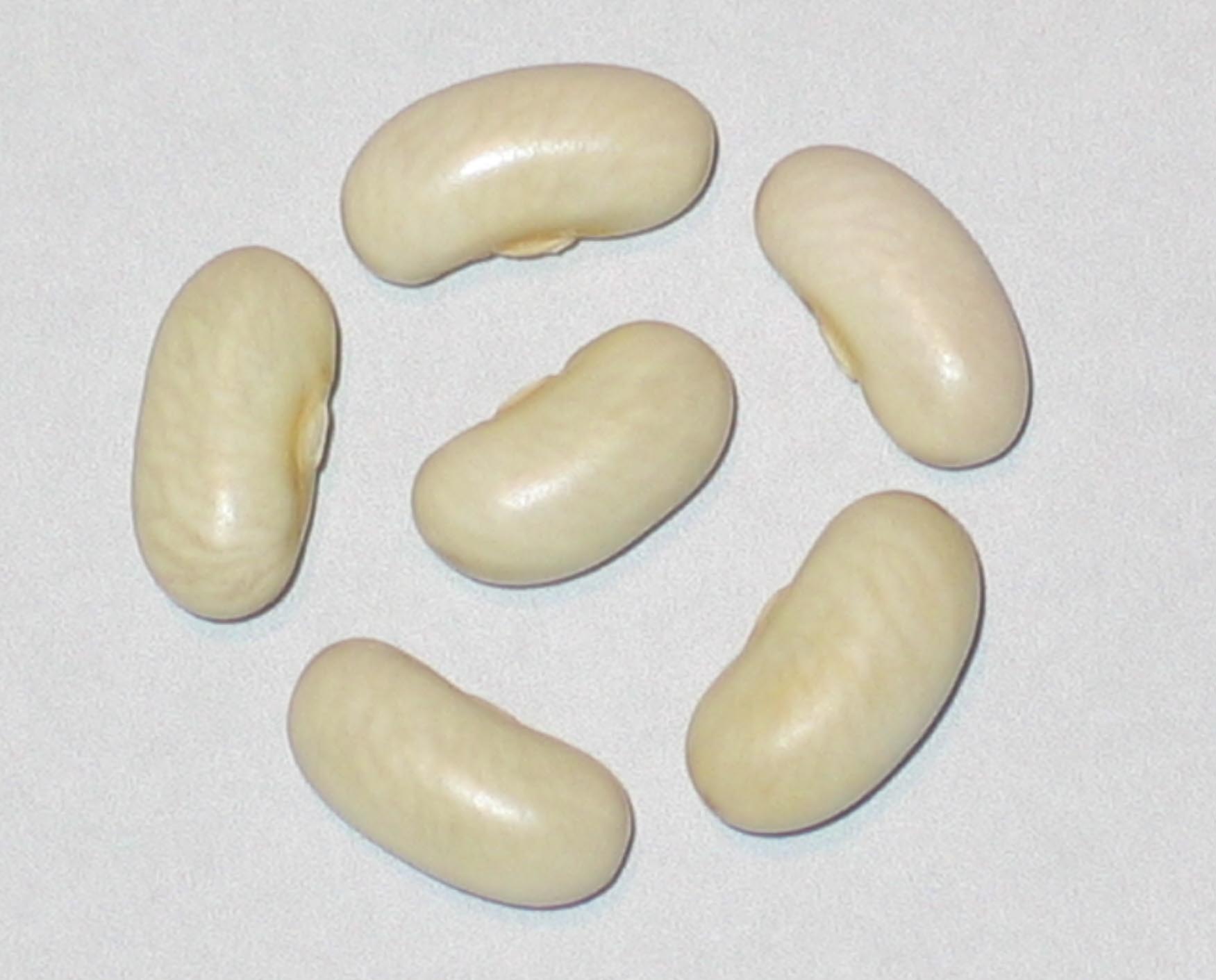
Comtesse de Chambord (BN 226)
Packet Size 45 Seeds $5.00
Bush/Snap. I reacquired the bean (photo on the left) from Two Wings farm in 2012, but the seed seemed smaller than I recalled what CDC was that I originally had in the 1980's. I had donated this seed strain to Seed Savers Exchange and I'm still sure to this day that this bean was the seed mother of Blue Jay. Especially having grown this bean two previous seasons before the birth of Blue Jay. Then during winter 2013 I requested from my donations list at Seed Savers Exchange this bean still being held by them in their collections. When the seed arrived. low, and behold a bit larger white seed just the way I had remembered Blue Jay's seed mother.
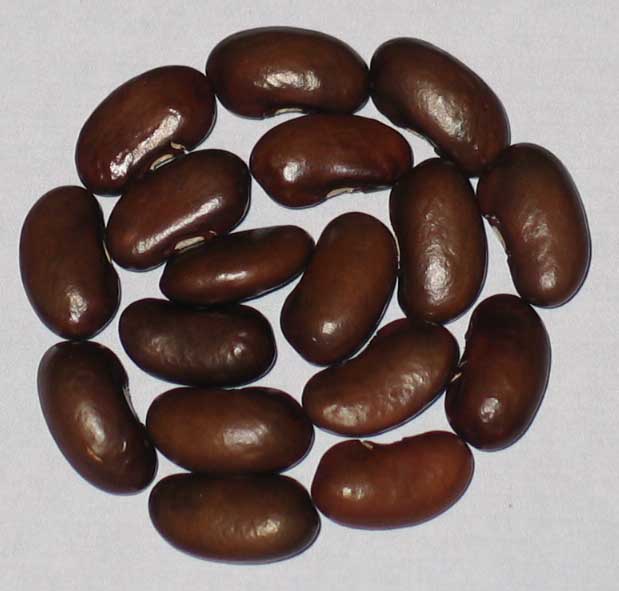
Connecticut Wonder
Packet Size 25 Seeds $5.00
Connecticut Wonder is a pole snap bean celebrated for its meaty, green, flattened pods that can range in color from green to a light lemon yellow, maturing in approximately 75 days. Discovered by Reverend Frank Abbott in his garden in Bolton, Connecticut, before 1919, this bean is thought to be a chance cross between Kentucky Wonder Wax and a Cranberry-type bean. Revered for its unique origins, Abbott affectionately remarked to his daughter that the bean was a gift from the bees, highlighting the serendipitous nature of its discovery and adding a whimsical charm to its history.
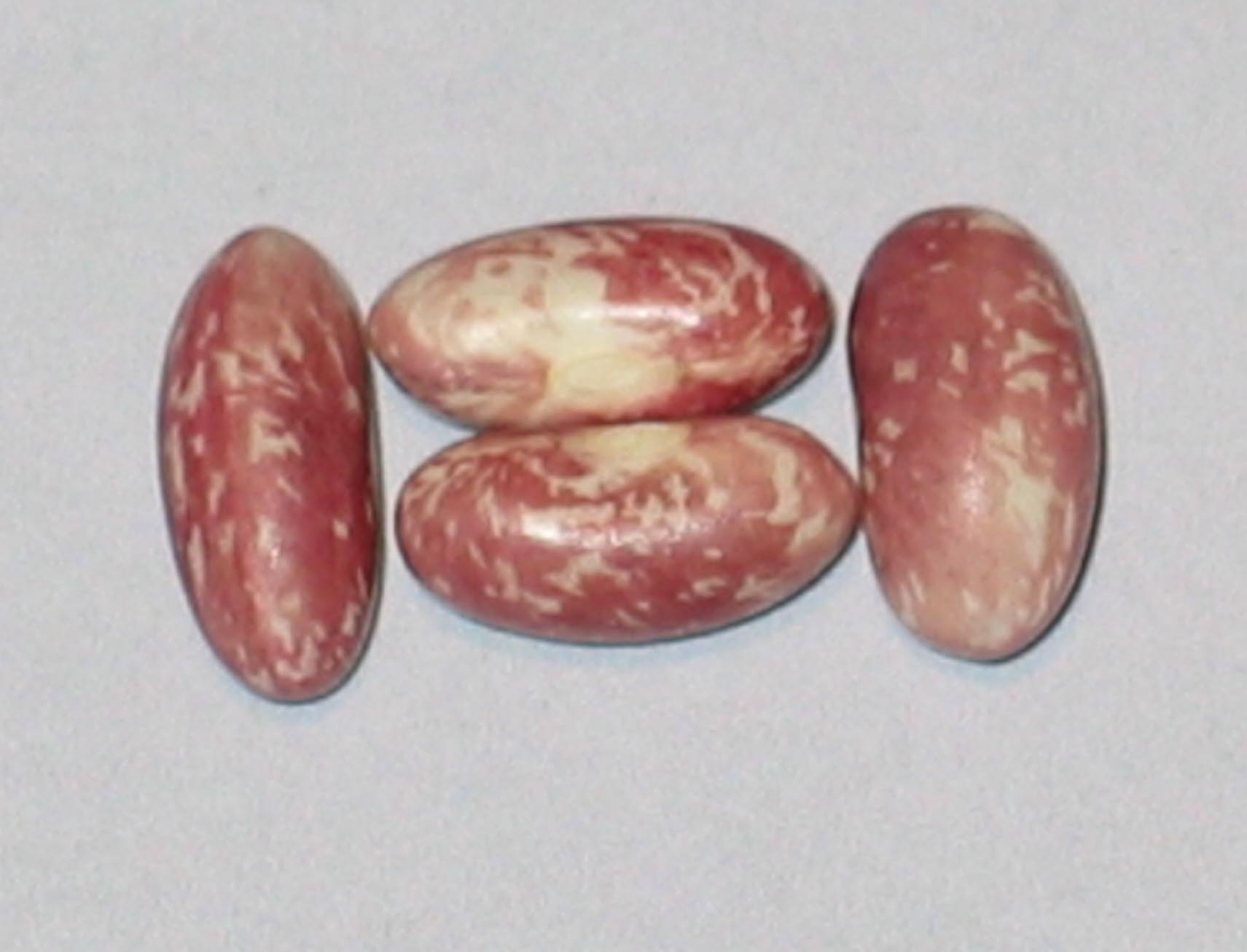
Conserva
Packet Size 35 Seeds $5.00
Conserva is a bush snap bean variety characterized by its compact growth habit, featuring white blossoms and light green foliage. The plant produces oval green pods that are fleshy yet not stringy, with a slight bend. Known as "Konserva" by German growers, it was marketed in 1925 by Samenzüchterei David Sachs, a seed nursery in Quedlinburg, Germany, and was bred by David Sachs's company. This variety is a cross between the European beans Alpha and Saxa, contributing to its unique characteristics. David Sachs, who lived from 1836 to 1918, played a significant role in the development of this bean.
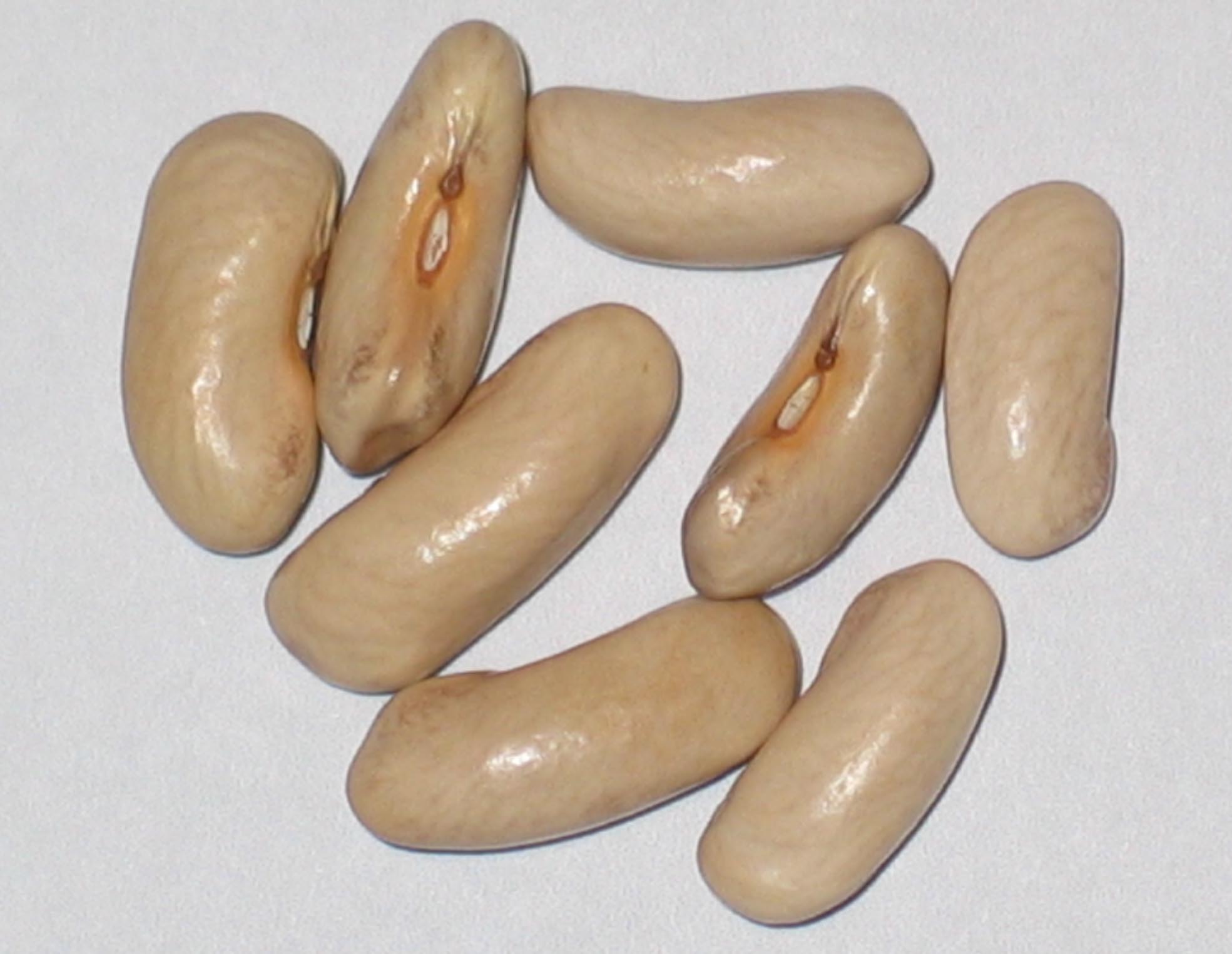
Contender
Packet Size 30 $5.00
Contender, also known as Buff Valentine, is a bush snap bean variety known for its early and prolific yield of oval-podded green snaps, maturing in approximately 50 days, with dry seeds ready in over 80 days. It features healthy, disease-resistant plants, making it a robust choice for gardeners. Developed at the USDA vegetable breeding lab in Charleston, South Carolina, by the late Dr. Wade, Contender was introduced to the public in 1949 and continues to be a popular selection, often found in seed catalogs and on seed racks today.
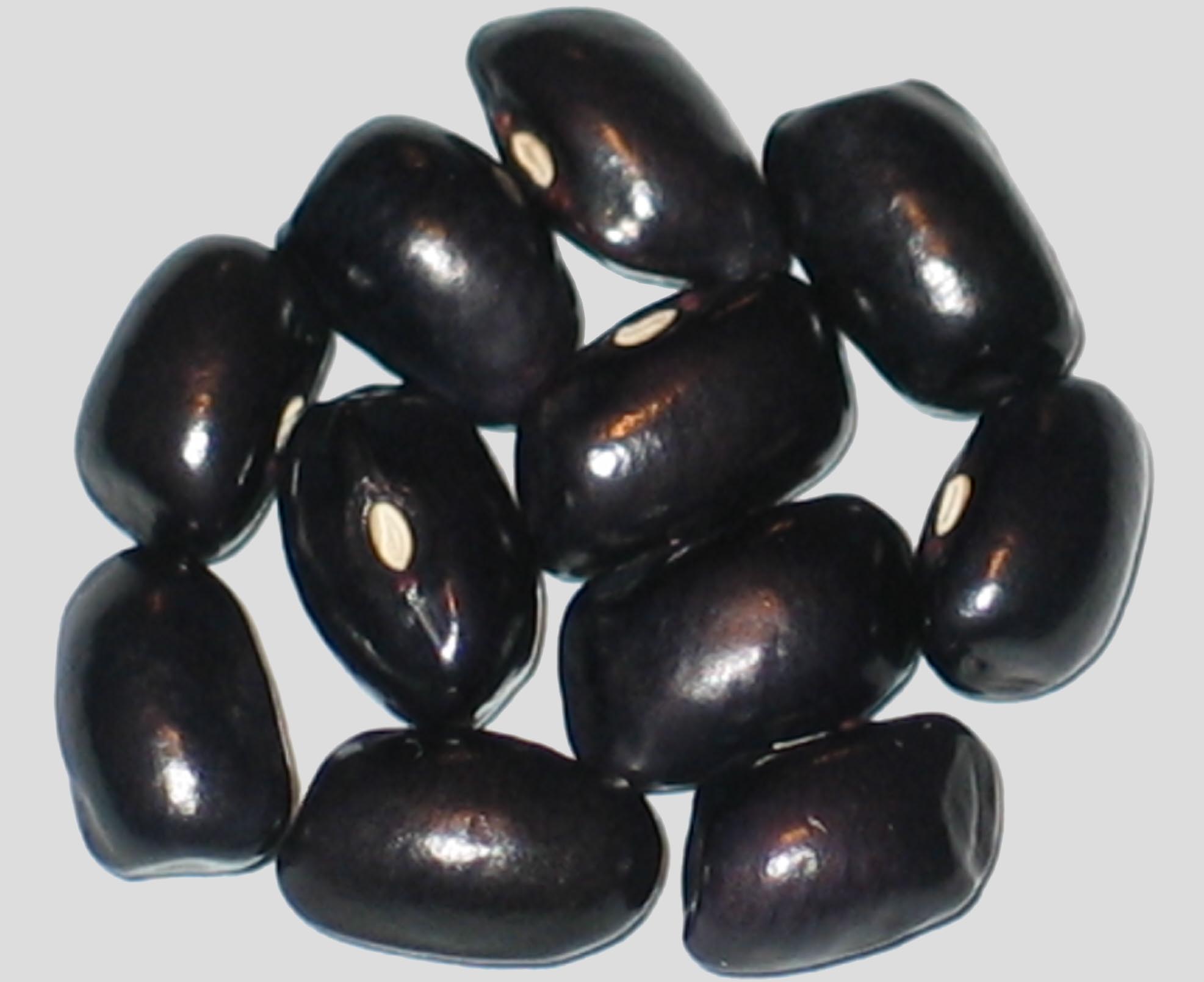
Corn Planter's Purple
Packet Size 30 Seeds $5.00
Corn Planter's Purple is a pole dry bean variety traditionally cultivated by the Native American Seneca tribe, known for its high productivity. As the seeds mature and the pods dry, the beautiful pods transition to a dark purple hue. This bean is also referred to as Black Snake and is primarily associated with the Seneca, although some suggest it may share historical ties with the Tutelo people of North Carolina and Virginia. Its striking color and historical significance make it a notable variety in heirloom gardening.
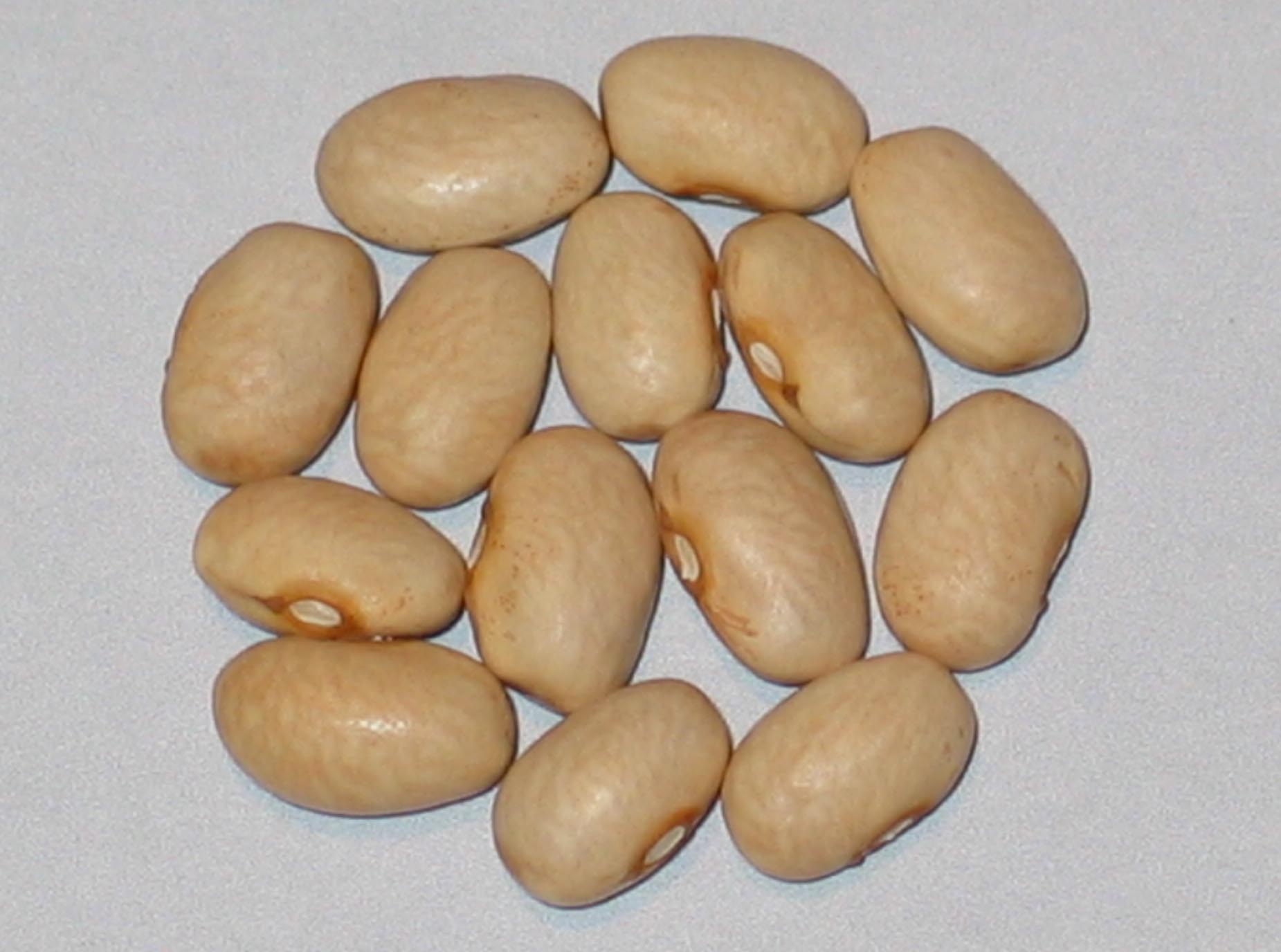
Cream Six Weeks
Packet Size 35 Seeds $5.00
Cream Six Weeks is a bush/dry bean variety that matures its first dry pods in approximately 85 days. It features lavender blossoms and produces viney plants that reach about 14 inches in height. The seeds are navy bean-sized, short, plump, and cream/tan in color. This variety yields a profusion of 4-inch pods that tightly wrinkle around the seeds when dry and display a blushed purplish hue when plump with immature seeds. Citing its characteristics I suspect this bean to be possibly a very old variety with an obscure history, reminiscent of the Refugee bean, which dates back to the 1800s, due to its similar pod and runner structure.
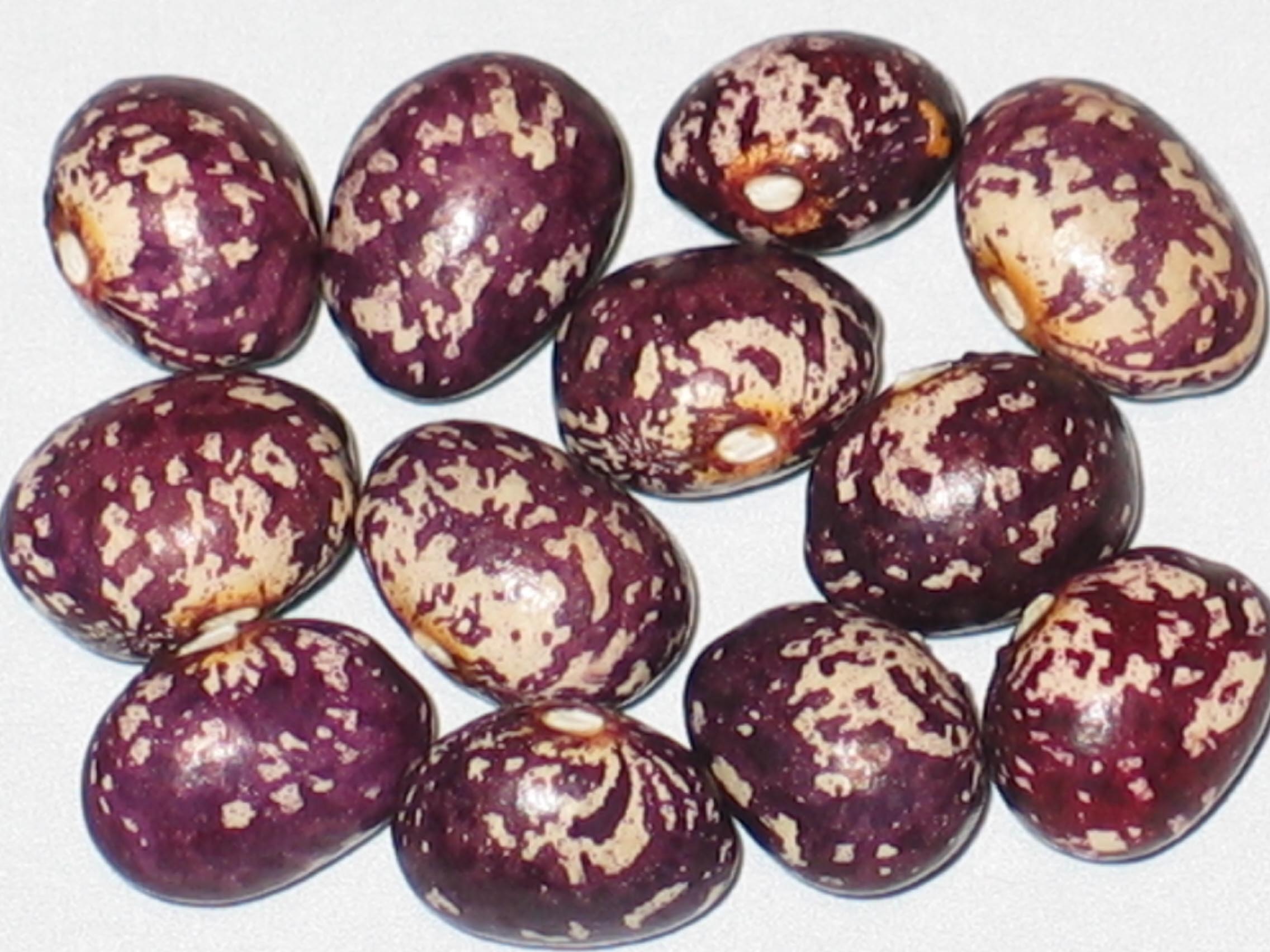
Cresnjevec
Packet Size 20 Seeds $5.00
Crenjevec is a pole dry bean variety with roots in Slovenia, sent to me by gardener in Germany during the winter of 2013. Named after a village in the municipality of Slovenska Bistrica in northeastern Slovenia, it is likely the variety's place of origin. Known for its high productivity, Crenjevec has become a favorite among dry bean enthusiasts of which I am one, and appreciated for both its performance in the garden and its unique heritage.
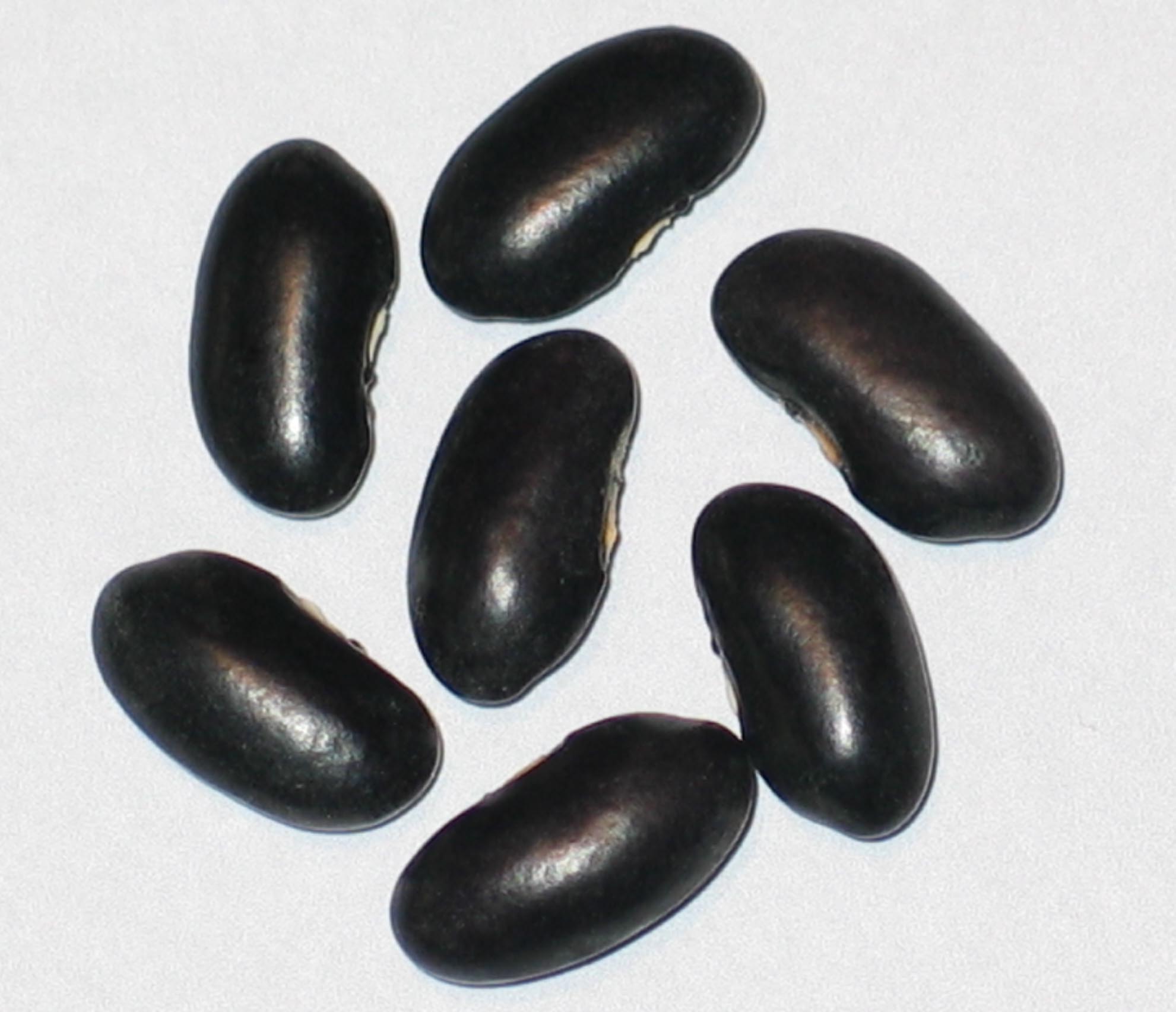
Crow River Black
Packet Size 25 Seeds $5.00
Crow River Black is a bush dry bean variety developed by Robert Lobitz in Paynesville, Minnesota, after selecting it from a packet of bean crosses received from Dan Jason of Salt Spring Seeds in Canada in 1993. This selection reflects a commitment to creating unique and productive bean varieties, making Crow River Black a noteworthy addition for gardeners and bean enthusiasts alike.
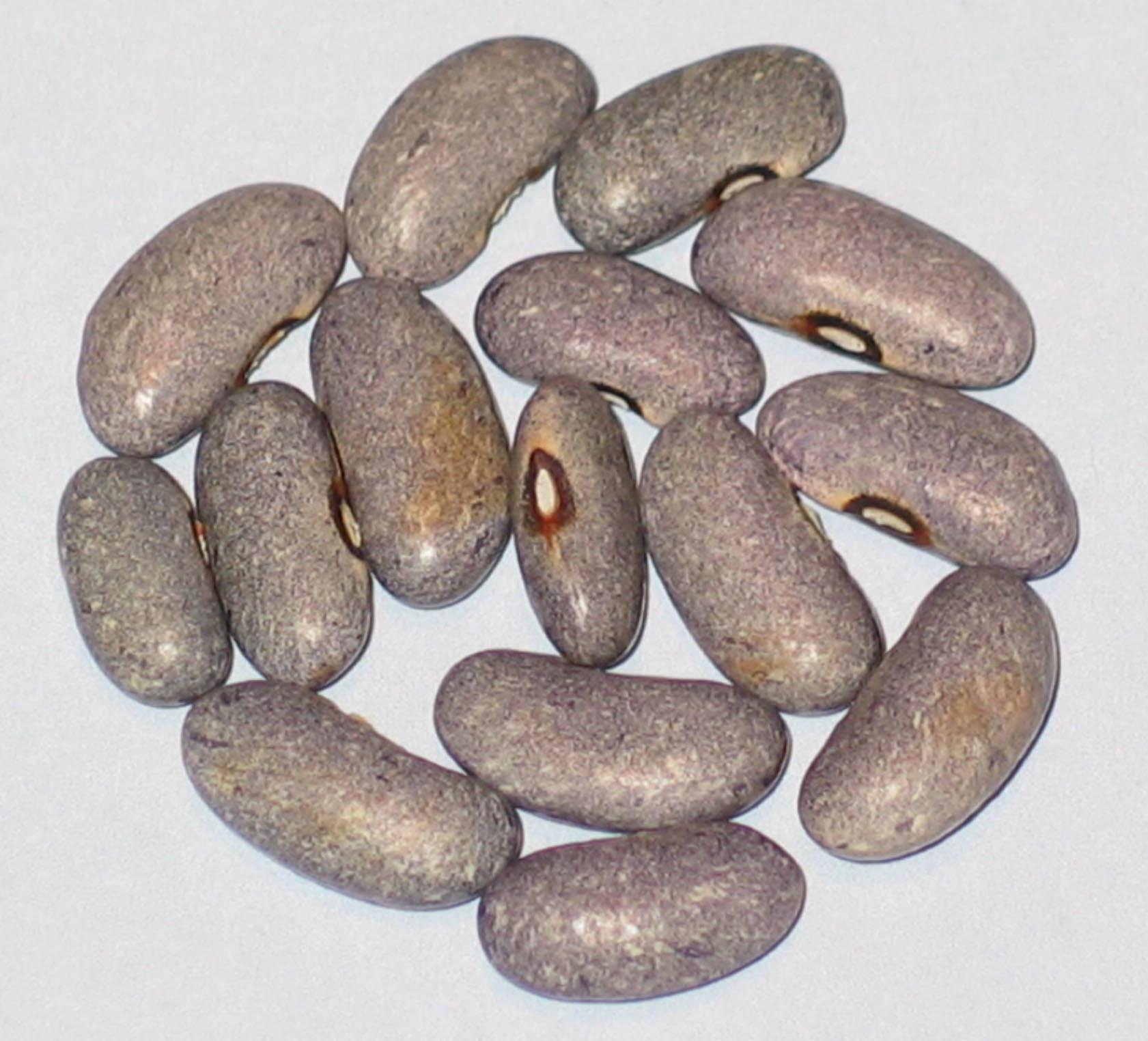
Cyrus Grays
Packet Size 30 Seeds $5.00
Cyrus Grays is a bush dry bean variety developed by Robert Lobitz, who introduced it through the Seed Savers Exchange Yearbook in 2004. Named after Cyrus, Minnesota, in Pope County, this hardy bean takes approximately 85 days to produce its first dry pods. Distinctive for its beautiful speckled gray appearance reminiscent of river pebbles, Cyrus Grays is noted for its resilience against fungal issues, making it a robust choice for gardeners.
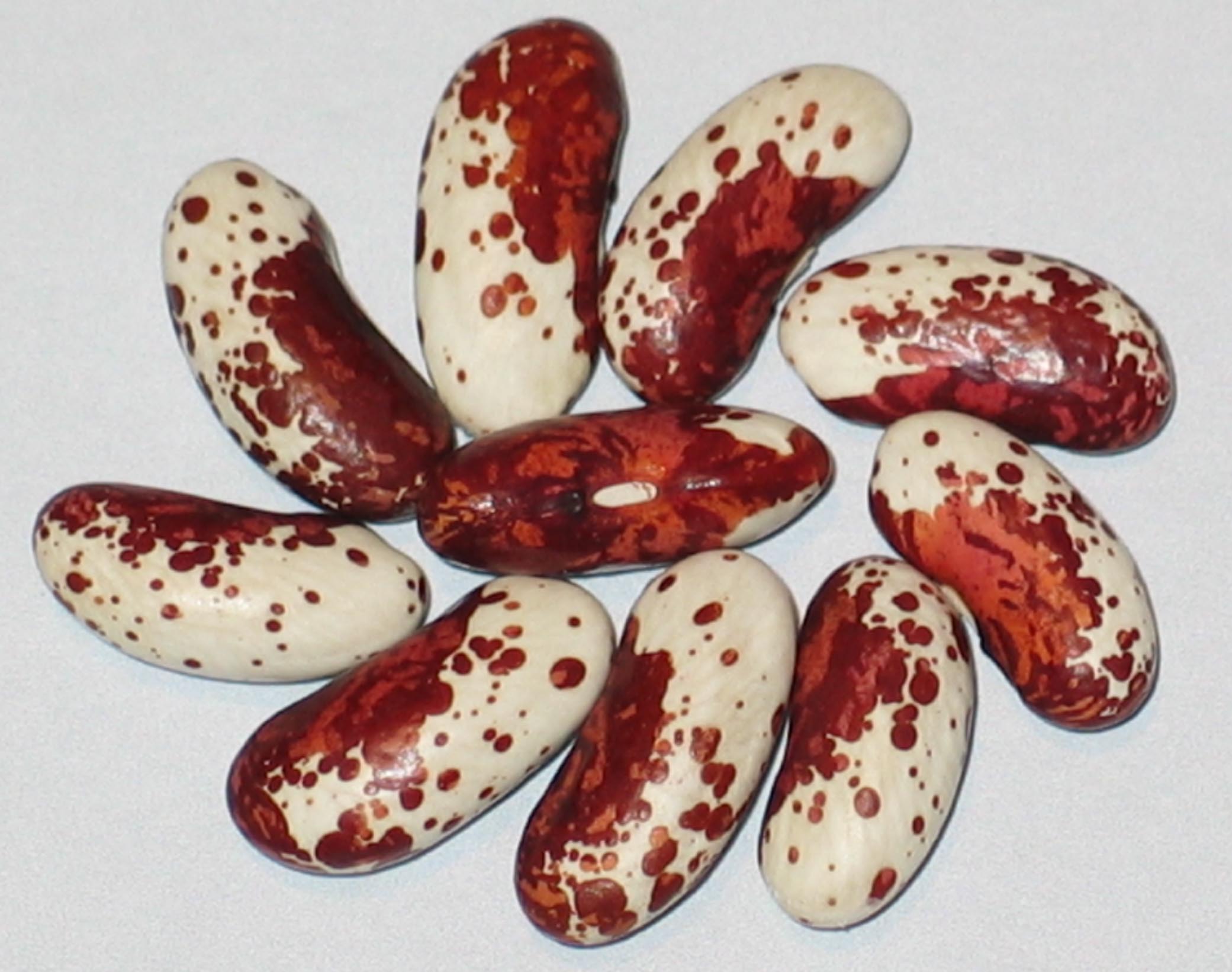
Dalmatian
Packet Size 25 Seeds $5.00
Dalmatian is a bush variety that requires over 90 days to produce dry seeds. Its seeds boast a vibrant, eye-catching pattern reminiscent of the Money bean but with more vivid colors. This productive, upright plant grows without the need for runners, making it ideal for various garden settings. Discovered in my garden and named by me in 1981, I chose to use the “ian” suffix as a nod to the synonym "Dalmation," which refers to Jacob's Cattle bean. The lineage of the Dalmatian bean traces back to its seed mother, Ernie's Big Eye.
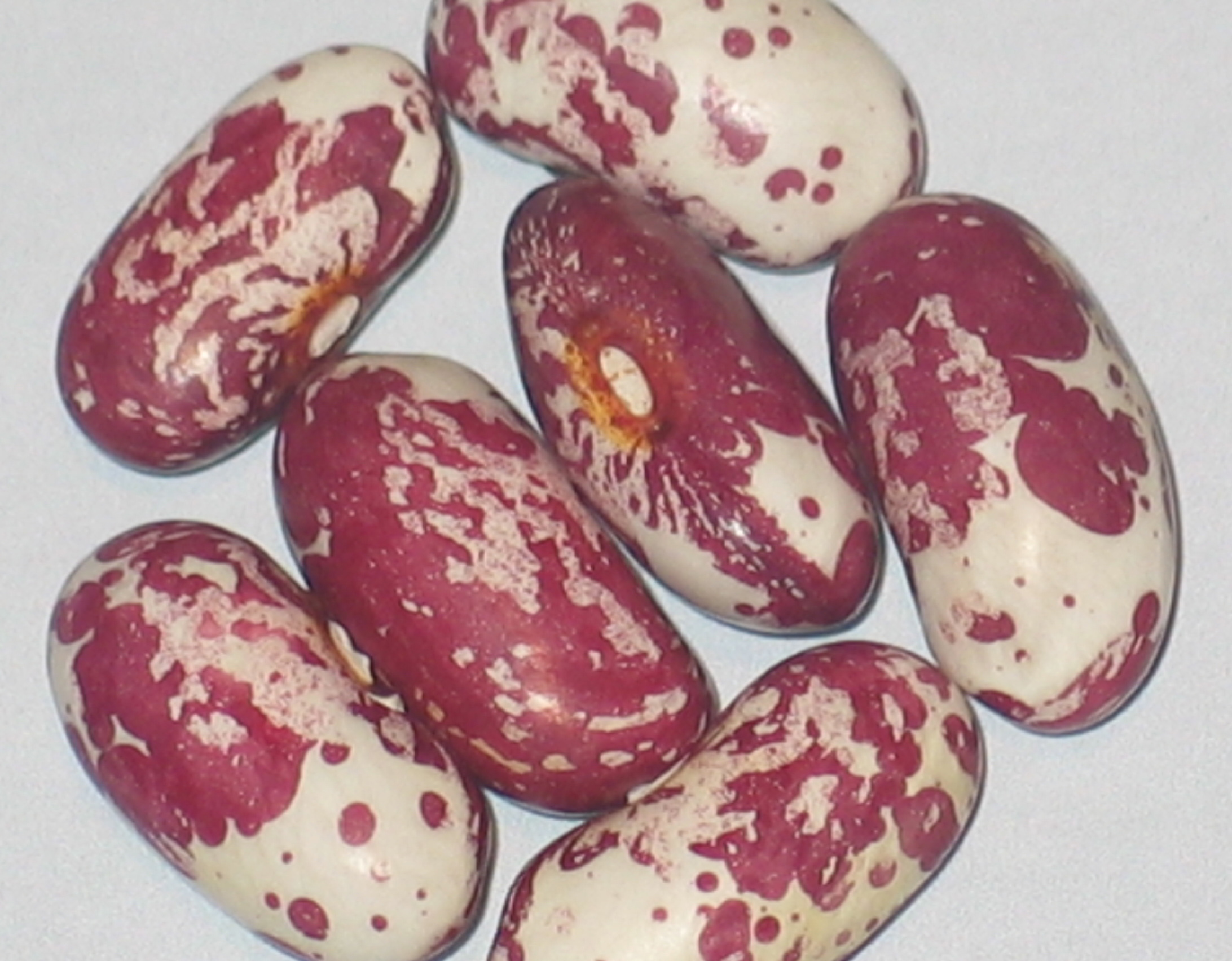
Dana's Soldier
Packet Size 20 Seeds $5.00
Dana's Soldier is a bush dry bean that reaches maturity in approximately 85 days, heralding the arrival of dry pods. An heirloom variety from the esteemed collection of early Seed Savers Exchange member Ernest B. Dana of Etna, New Hampshire, this bean was discovered and stabilized in his gardens during the 1970s. A delightful variation of the Trout or Jacob's Cattle type seed coat patterns, Dana's Soldier reflects the passion and dedication Ernie had for his beloved bean varieties.
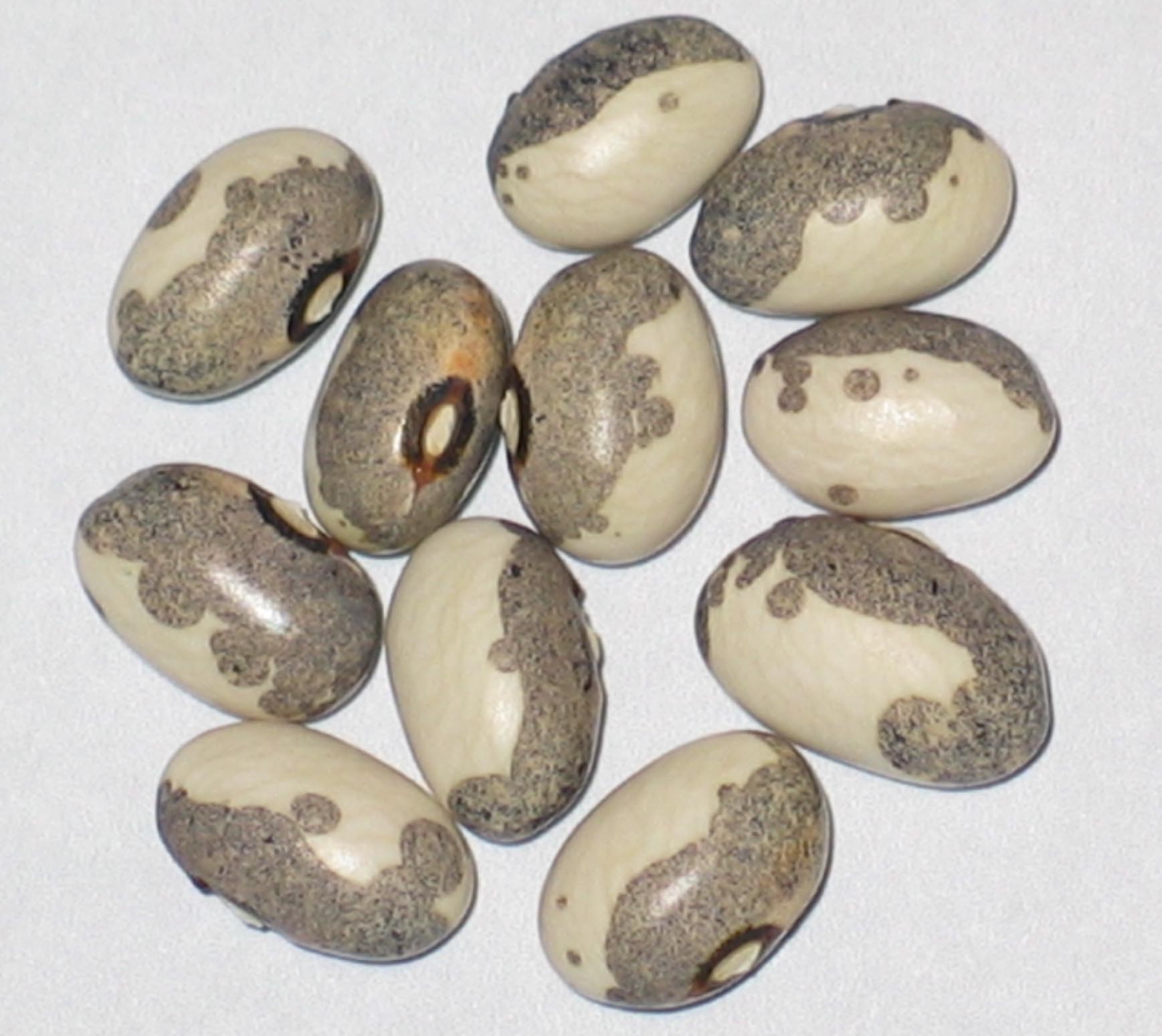
Dapple Grey
SOLD OUT
Dapple Grey is a bush dry bean that matures in 60 to 70 days, producing on compact 12 to 18 inch plants. This early maturing variety likely derives its name from its color, which resembles that of a Dapple Grey horse. Despite its charming appearance, there is no known historical background for this bean, leaving its origins a mystery.
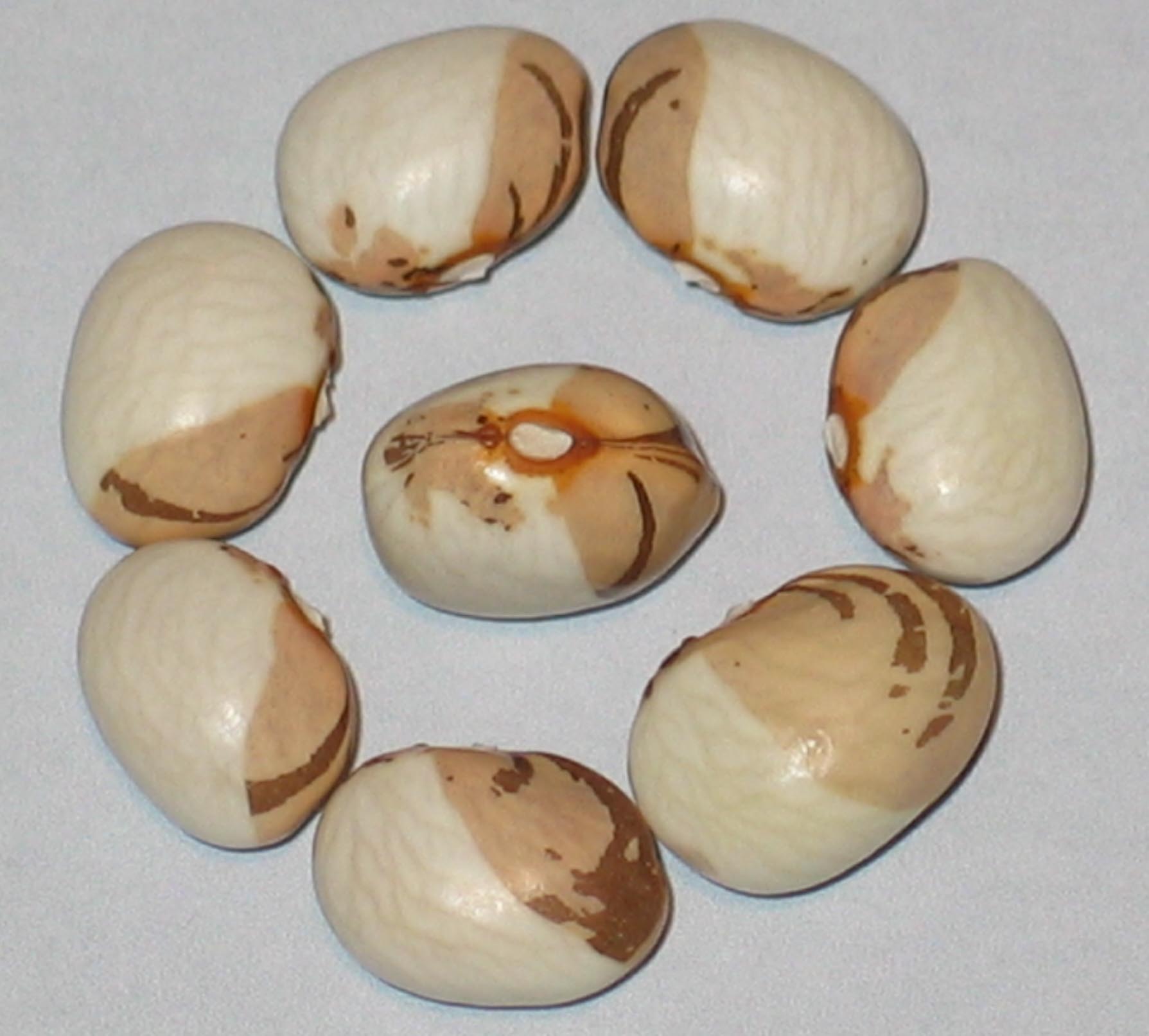
Deb's Creek
Packet Size 15 Seeds $5.00
Deb's Creek is a pole dry bean, characterized as a moderate climber, and is notably an Australian variety. Productive and produces a nice quality of seed. This unique bean was graciously gifted by Harriet Mella, a friend from Austria, adding an international flair to any garden. There seems to be no significant historical information about the beans history or origin.
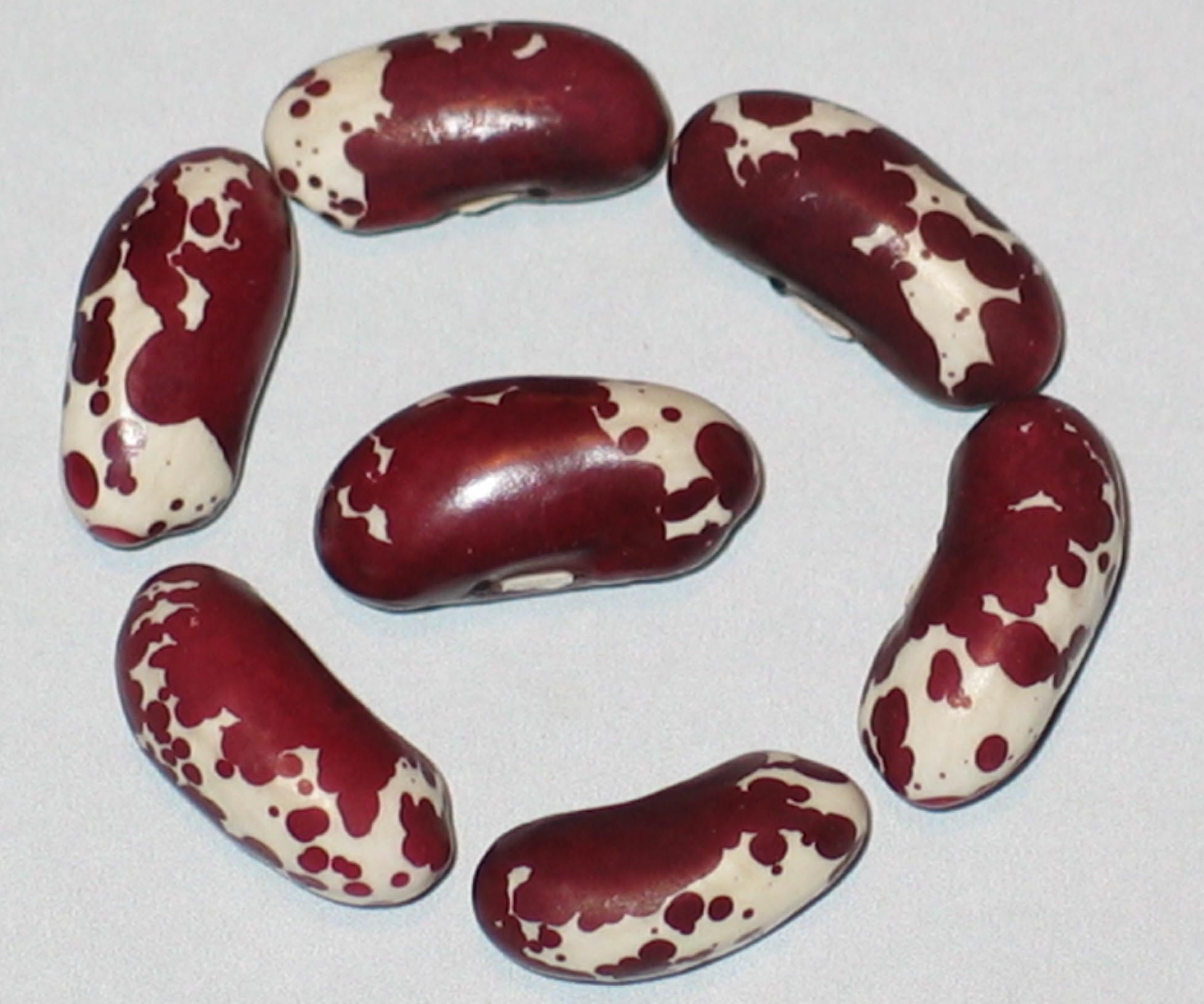
Deep Red Trout
Packet Size 25 $5.00
Bush dry bean grows without runners. Larger trout type seeds distinguish this variety over Jacob's Cattle. Productive plants produce six inch long and half inch wide pods. Pods dry a little later than early bush dry beans varieties. Given to John Withee's Wanigan Associates by former SSE member the late Ernest B. Dana of Etna, New Hampshire.
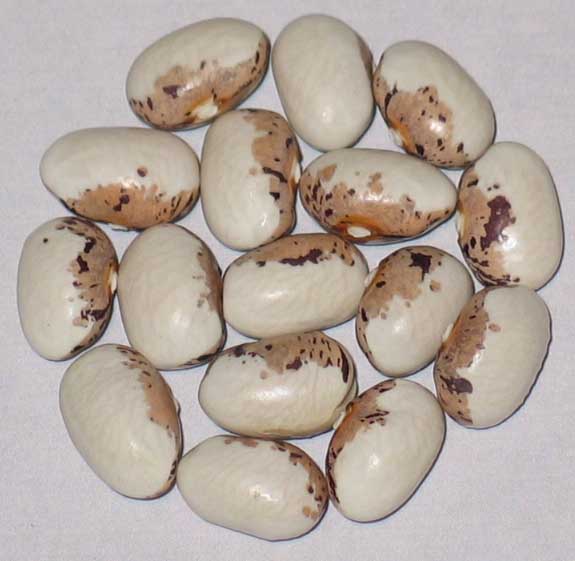
Del Angelo
Packet Size 20 $5.00
Pole dry and snap. Eight foot vines produce 5 inch pods which contain nice sized seed. Not huge seeds but not small ether. Productive bean may have been grown around Genoa, Italy. An Italian heirloom that is dual purpose – can be eaten as snaps and also used as a dry bean. It’s likely that this bean was brought to North America by Joseph Simcox, the international seed collector. Seeds also are uniquely pretty, difficult to describe but the marble shaped beans are ivory, with a pigeon grey partial overlay which is speckled in a charcoal or chocolate colour. Seeds are medium size. A beauty.
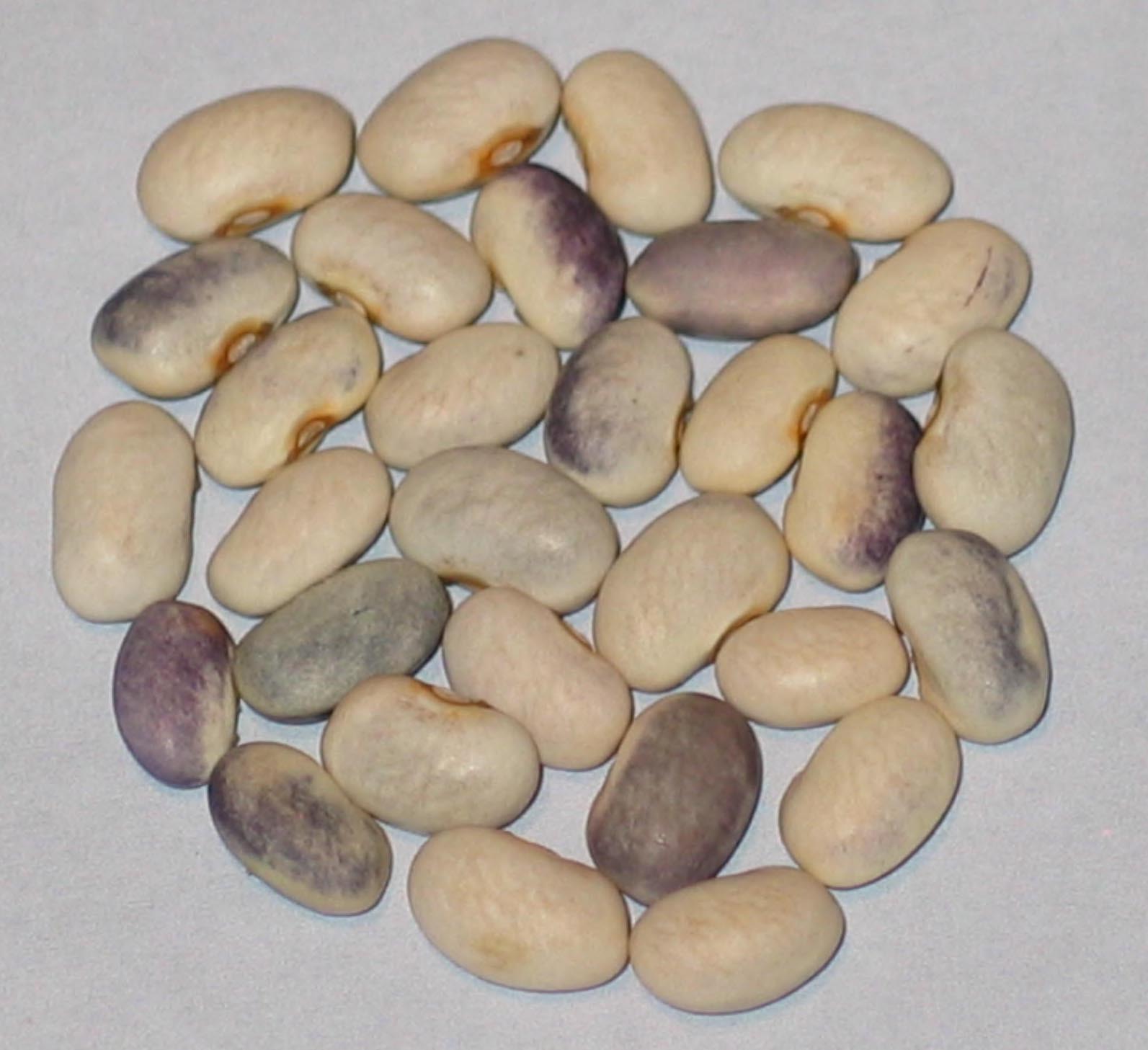
Delano
Packet Size 35 $5.00
Delano is a bush dry bean that grows without runners, featuring delicate lavender blossoms. It typically takes about 90 days to produce its first dry pods, which are strikingly purple and measure approximately 5.25 inches in length. The seeds are smaller than those of a Navy bean, characterized by an off-white color with subtle purple blushes. This variety was originally named by the late Robert Lobitz and was first introduced through the Seed Savers Exchange yearbook in 2005, highlighting its value in seed preservation and heritage gardening.
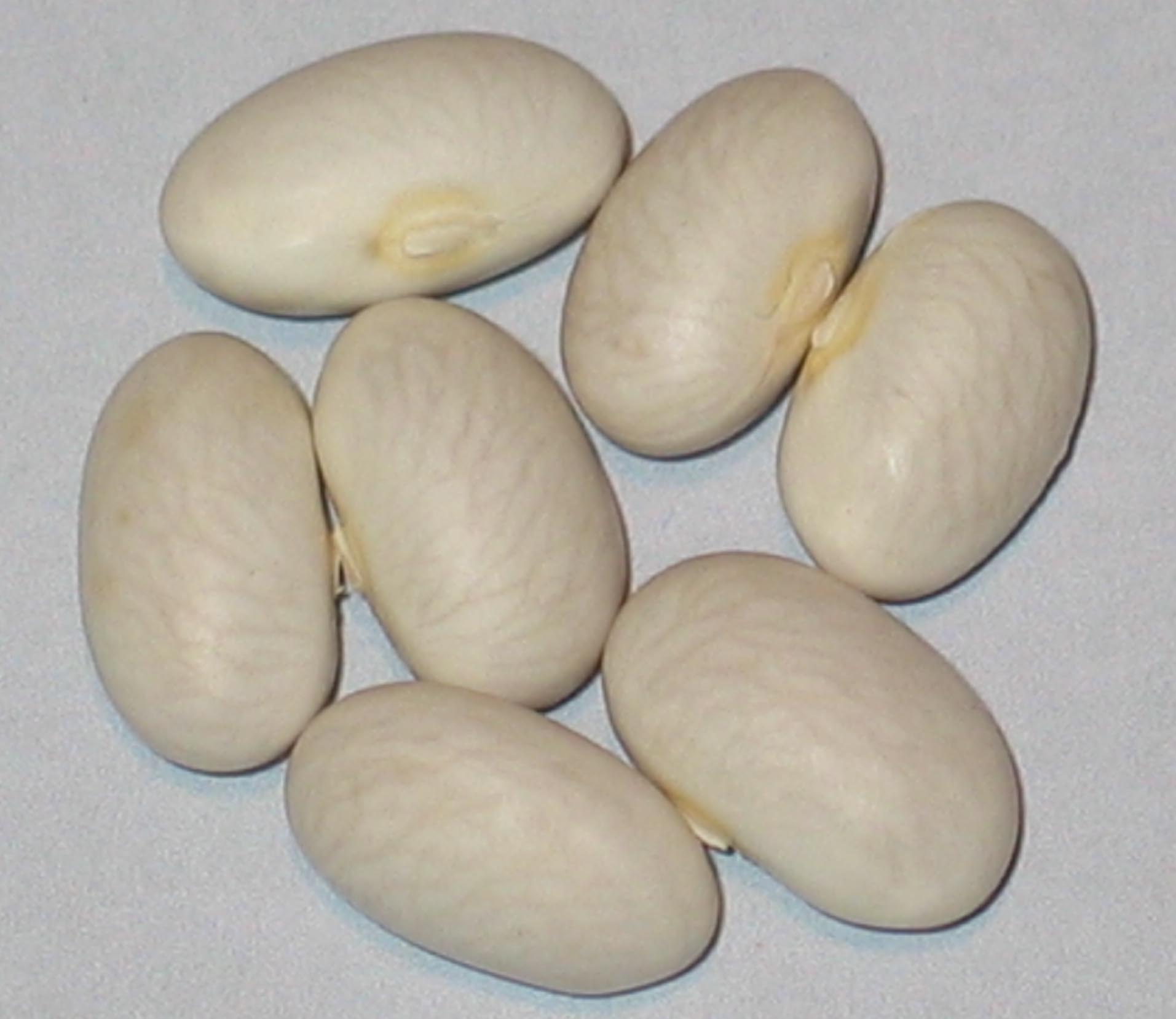
Deseronto Potato
SOLD OUT
Deseronto Potato is a semi-runner dry bean variety with roots in the Abenaki nation and has been traditionally cultivated by the Iroquois and Seneca peoples of North America. This moderately climbing plant can be grown as a pole bean or as a half runner, reaching heights of about 4 to 5 feet. Known for its versatility, the beans can be utilized as a thickener in soups or mashed like potatoes, making them a valuable addition to various dishes. This variety reflects both cultural heritage and practical culinary use.
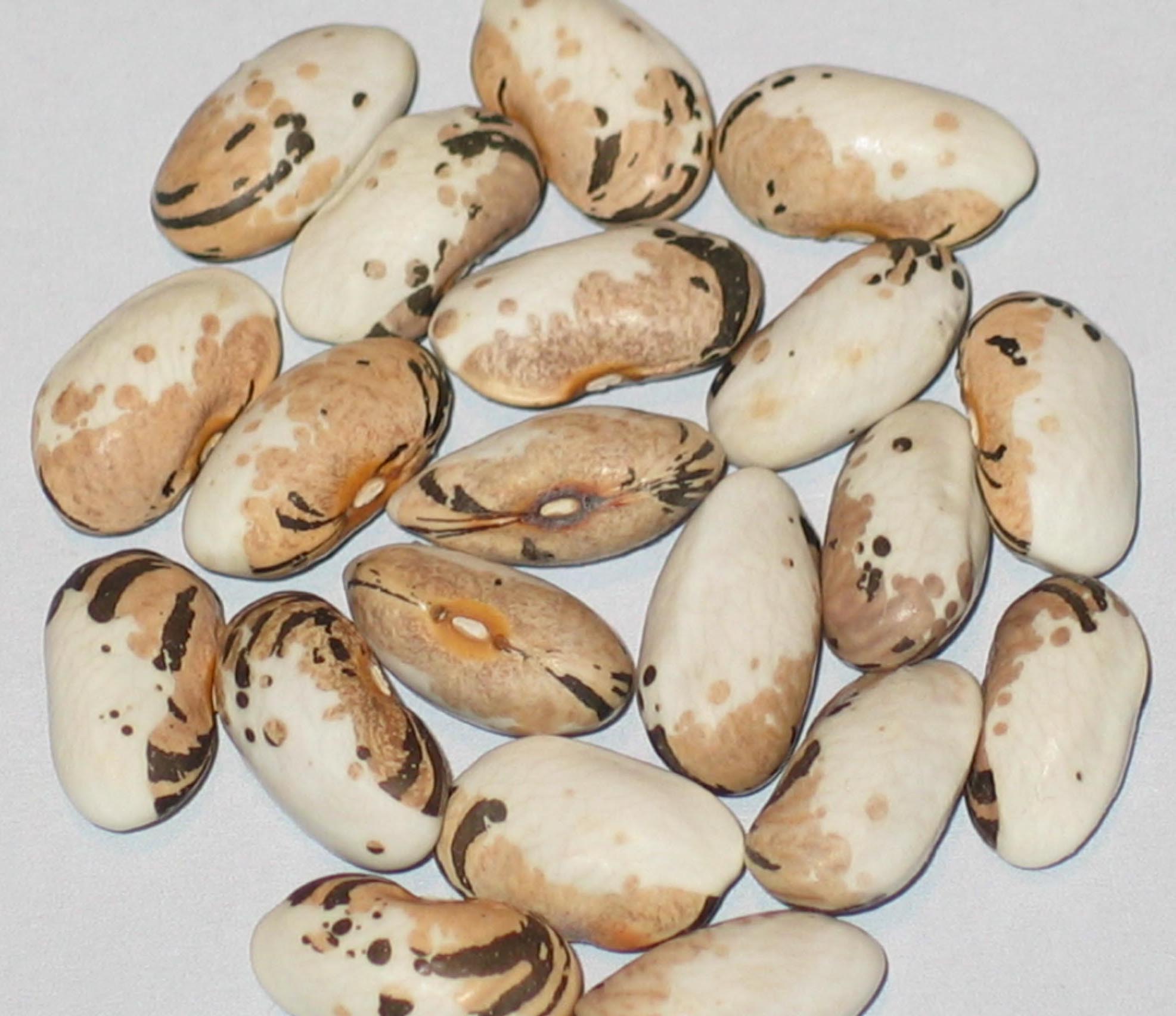
Dlouha Pulena Ze Smolijanu
Packet Size 20 Seeds $5.00
Dlouha Pulena is a pole dry bean with origins as a European heirloom from the Czech Republic, known for its early maturity, typically producing its first dry pods in about 100+ days. The seeds are striking, featuring a tri-colored pattern of white, oatmeal, and chocolate hues. Often described as an elegant and dignified bean, Dlouha Pulena stands out not only for its visual appeal but also for its rich heritage, making it a cherished choice among gardeners and bean enthusiasts alike.
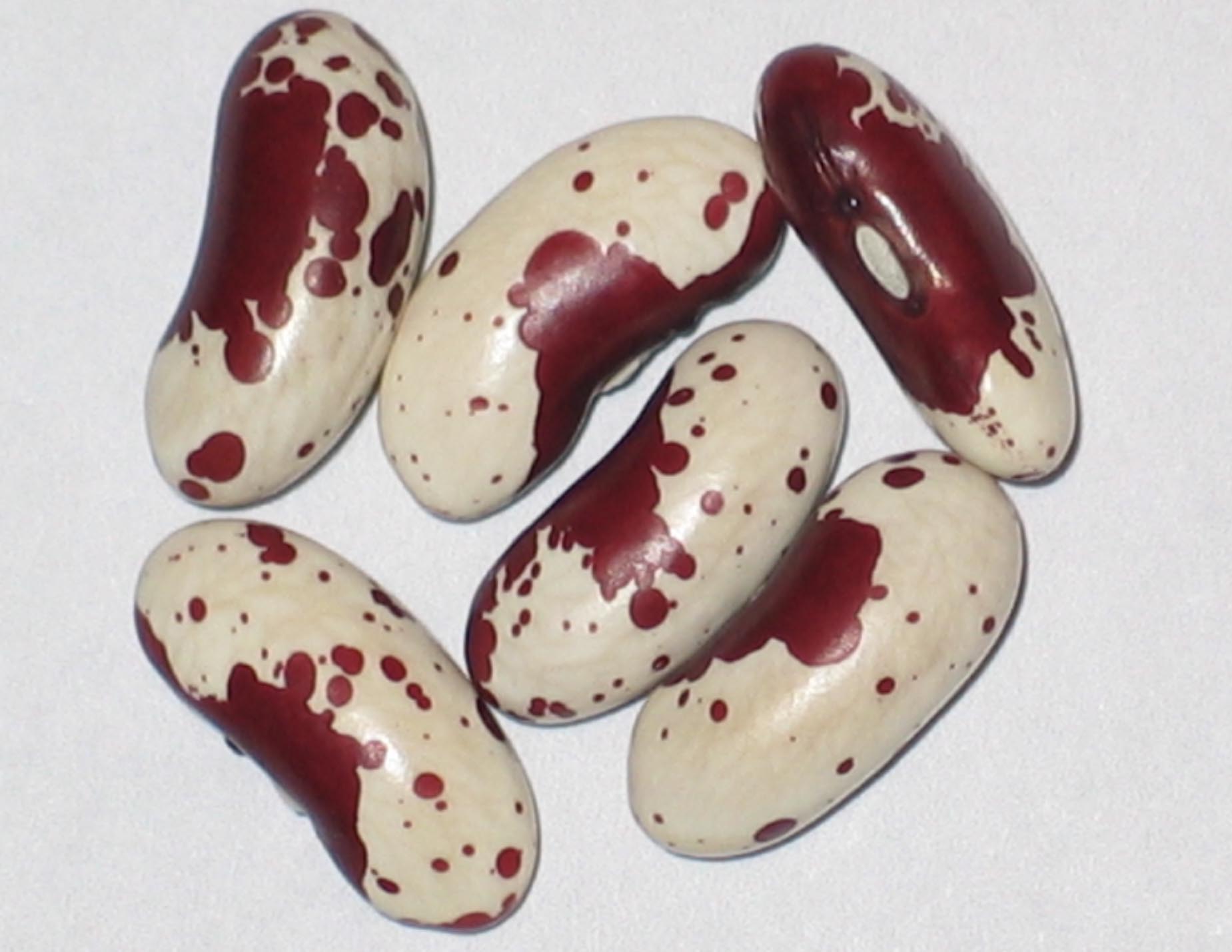
Dog Bean
Packet Size 25 Seeds $5.00
Dog Bean is a bush dry variety that typically produces dry seeds in about 90 days. Its intriguing appearance suggests it may be another strain of Jacob's Cattle, featuring a similar seed coat pattern and coloring characterized by areas of white and red, though the distribution of these colors differs from classic Jacob's Cattle beans. This unique coloration and potential genetic connection make the Dog Bean a fascinating choice for gardeners looking to explore diverse varieties.
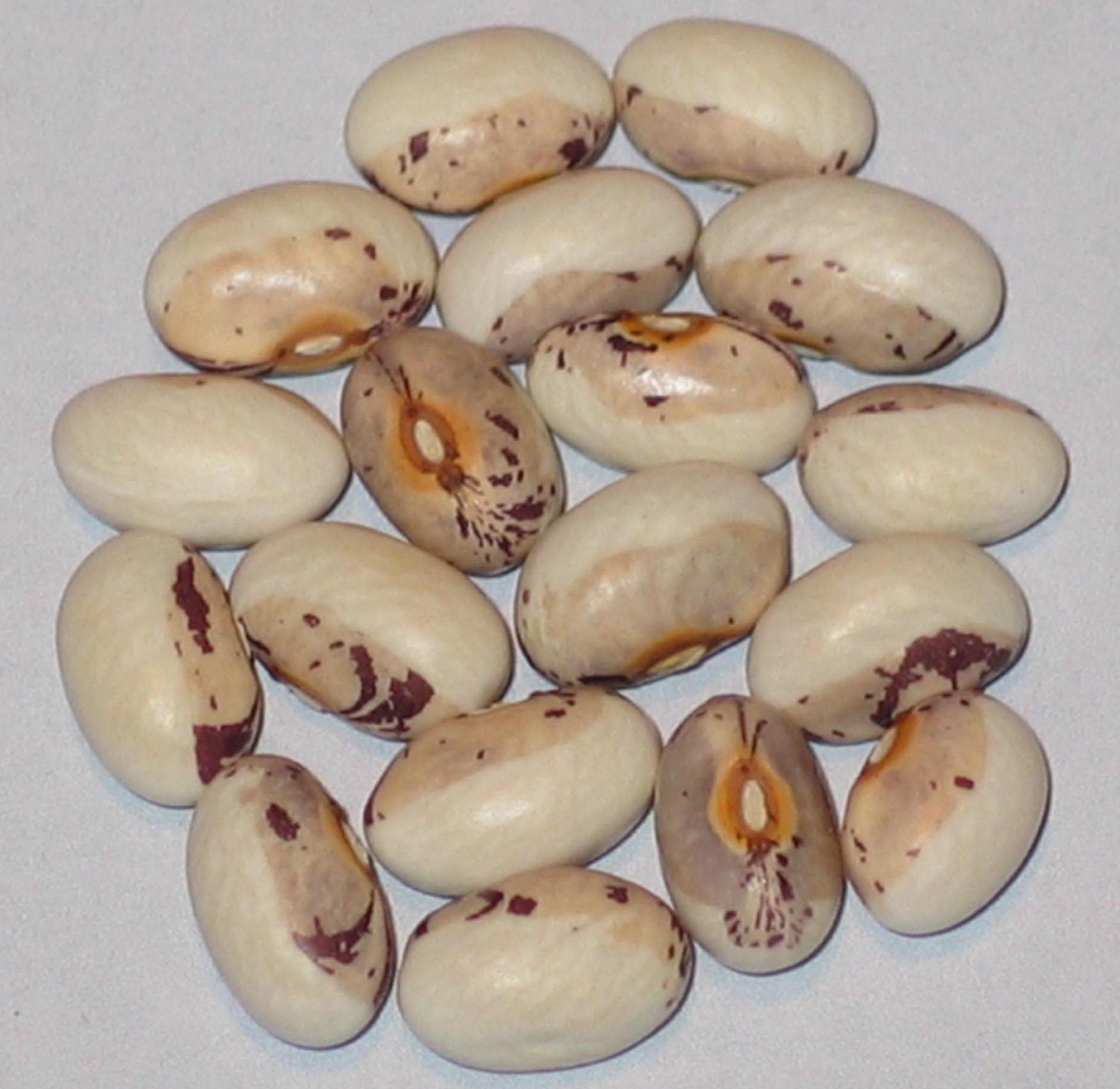
Dwarf Sheild
Packet Size 30 Seeds $5.00
Dwarf Shield is a semi-runner dry bean that typically matures in about 90 days but has been observed to produce its first dry pods in as few as 82 days in optimal conditions. Notably, this variety can dry its entire set of pods in just 23 days and develops attractive yellow pods during its growing season, despite not being classified as a wax bean. Introduced by Robert Lobitz in 1999 through the Seed Savers Exchange, this bean is named for its color pattern, which resembles that of the traditional Hidatsa Shield Bean, adding a touch of heritage to its cultivation.
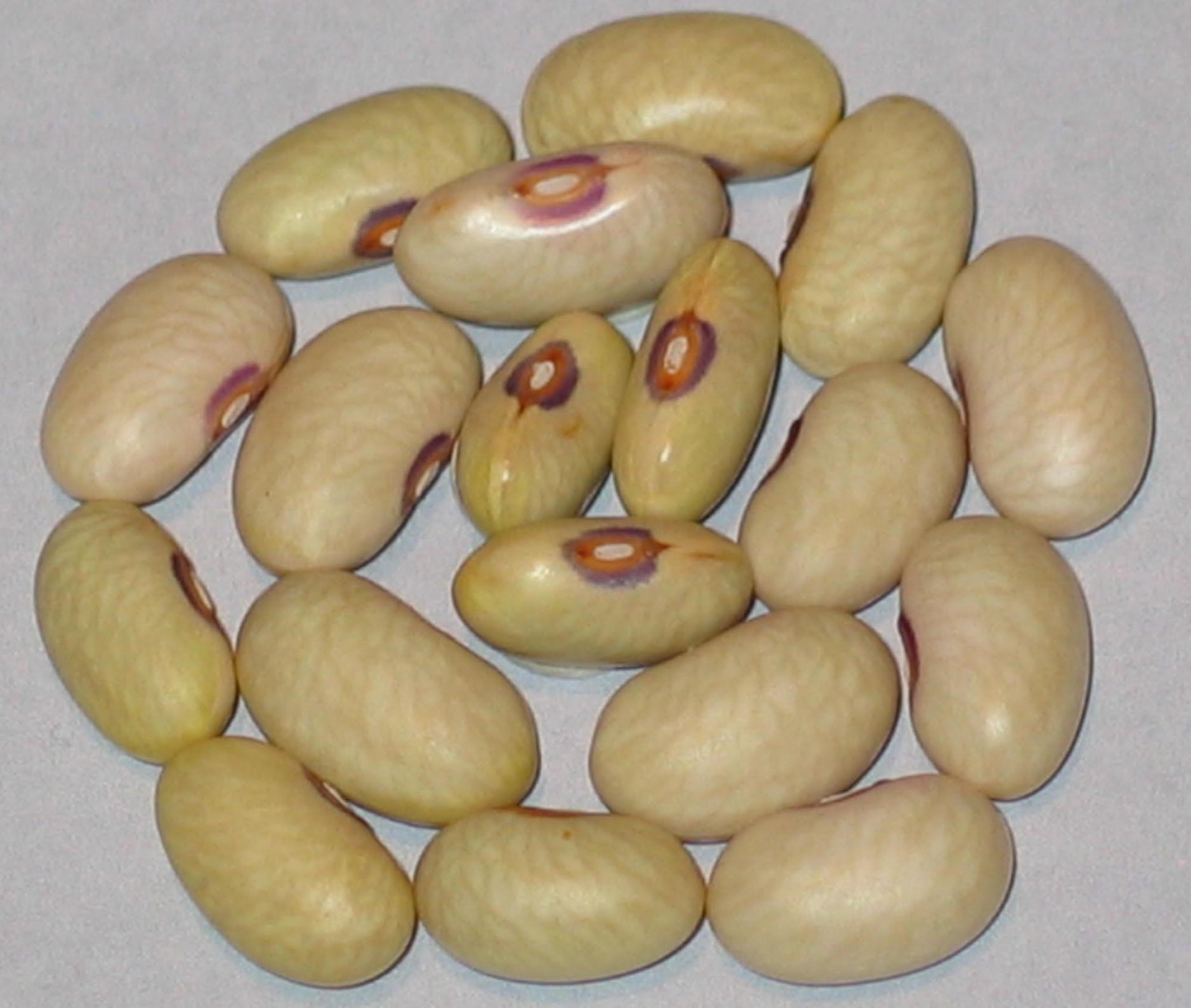
Eagle Bend
Packet Size 25 Seeds $5.00
Eagle Bend is a bush dry bean that matures in approximately 85 days, with the first dry pods appearing within this timeframe, followed by the remainder drying sequentially over about three weeks. This variety was named by me and was developed from a collection of beans left by Minnesota bean developer Robert Lobitz, who passed away in 2006. The genetic material for Eagle Bend was sourced from Ron Thuma of Hartford, Kansas in 2015 from his grow outs. Ron had acquired the original material from James Lobitz, Robert's brother, in 2008. Neither Ron Thuma or Robert Lobitz ever saw this bean.
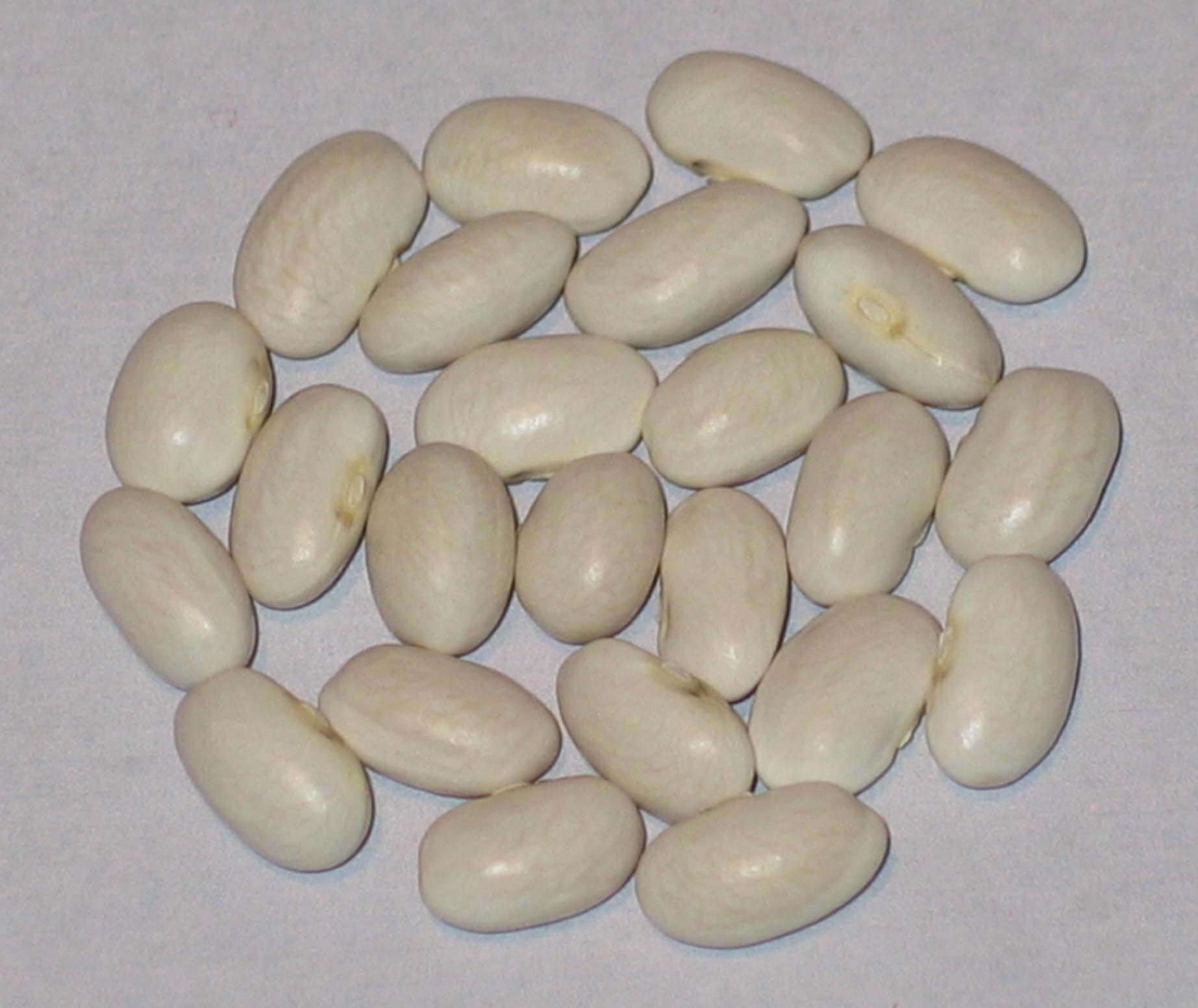
Eagle Island White
Packet Size 25 Seeds $5.00
Eagle Island White is a bush dry bean that reaches maturity in about 85 days, producing its first dry pods within that period, followed by the remaining pods drying sequentially over approximately three weeks. The plants typically grow to about 17 inches tall and are adorned with white blossoms, bearing 4-inch pods filled with medium-sized oval beans. This variety is an original creation by Robert Lobitz, showcasing his commitment to bean cultivation and diversity.
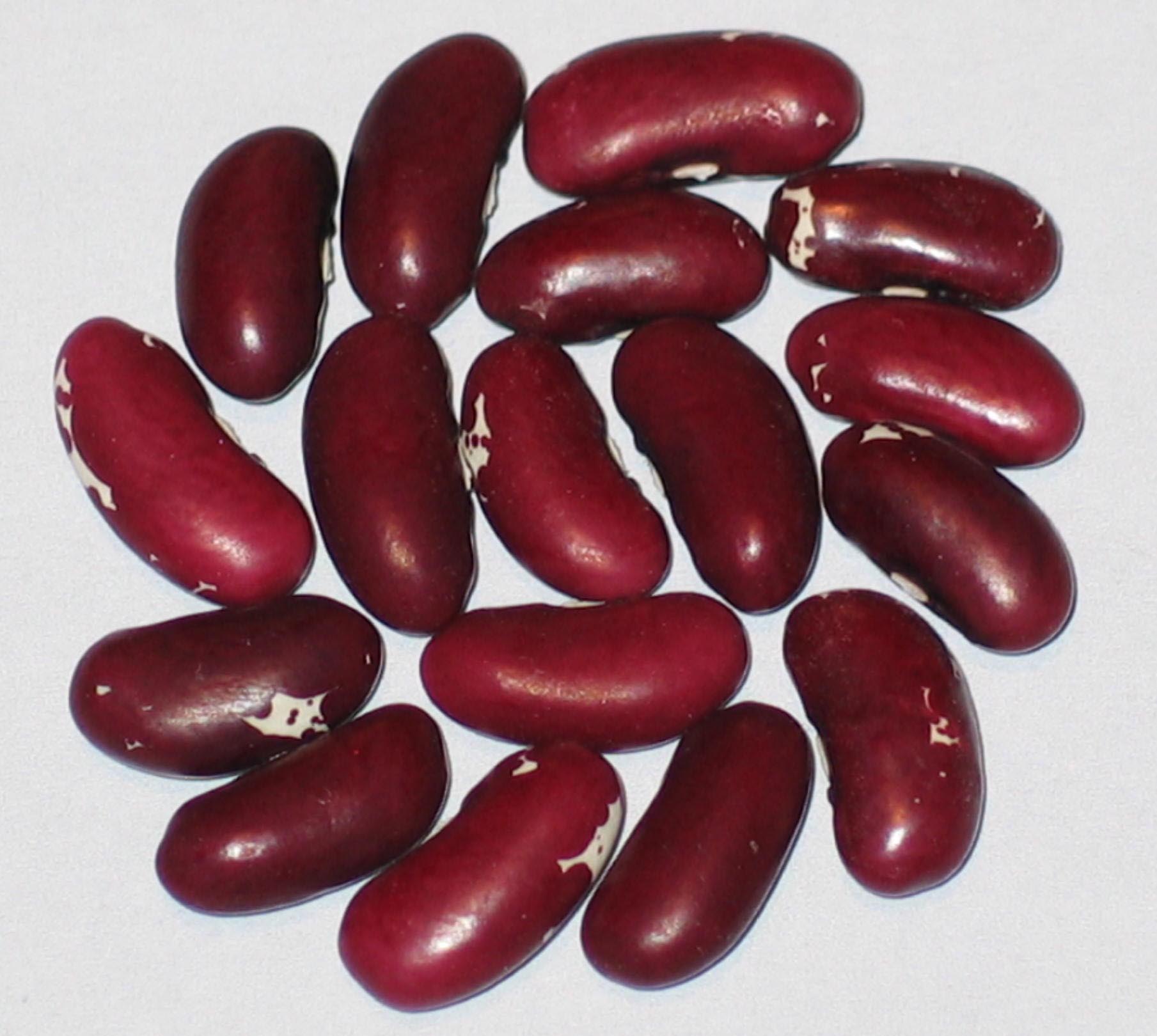
Early Vermillion
Packet Size 25 seeds $5.00
Early Vermillion is a bush dry bean that impressively matures in just 71 days, with its first dry pods appearing within this timeframe and the complete pod set drying down in only 18 days thereafter. This remarkable variety was named and introduced by the late Robert Lobitz of Paynesville, Minnesota, through the Seed Savers Exchange yearbook in 2004, showcasing his dedication to the never ending diversity of beans.
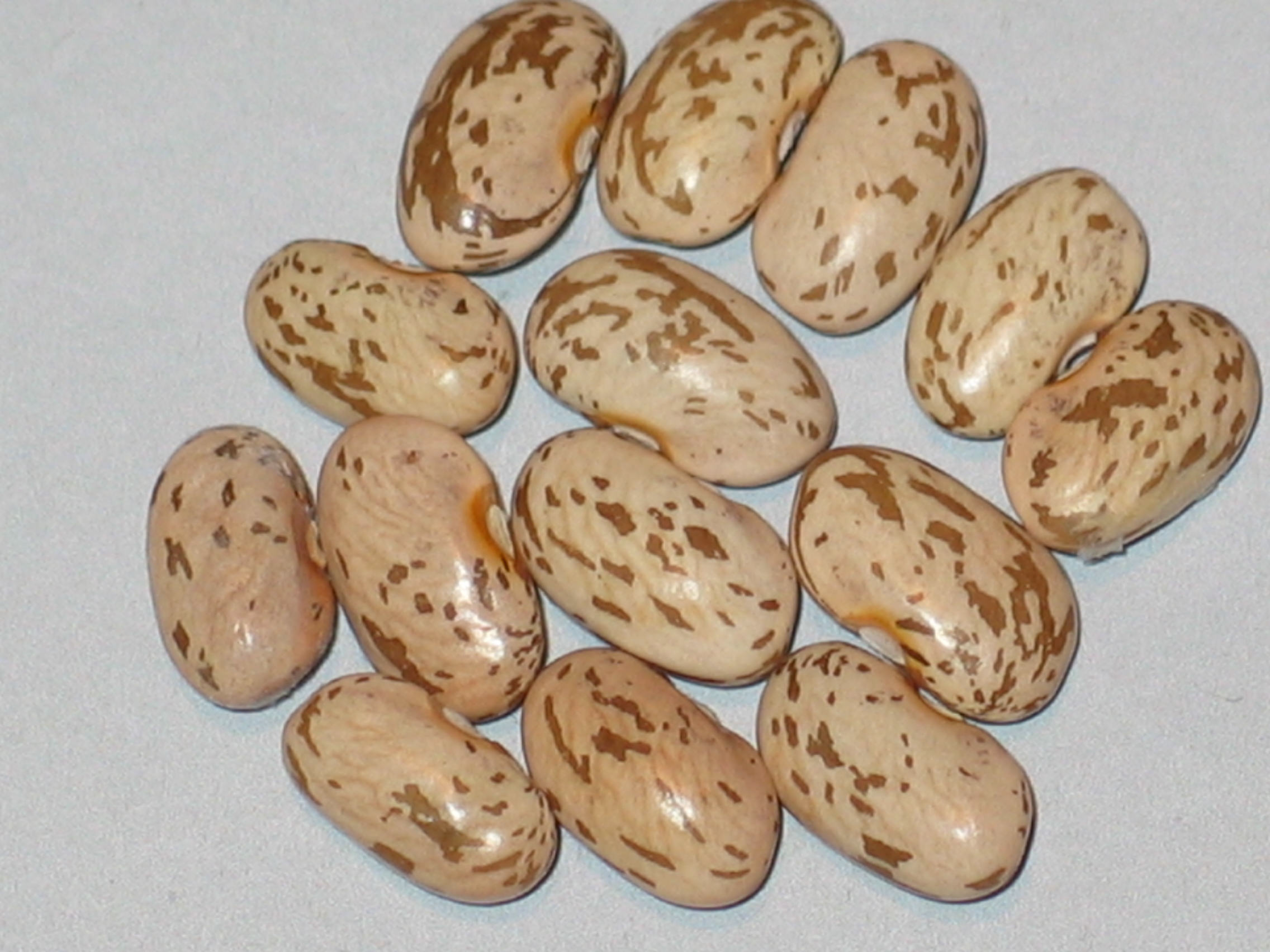
Early Victor
Packet Size 35 seeds $5.00
Early Victor is a semi-runner dry bean that reaches maturity in 76 days, displaying its first dry pods during this period. It produces small, pinto-colored beans, and is one of the many varieties named and introduced by the late Robert Lobitz of Paynesville, Minnesota, through the Seed Savers Exchange, highlighting his contribution to bean diversity and cultivation.
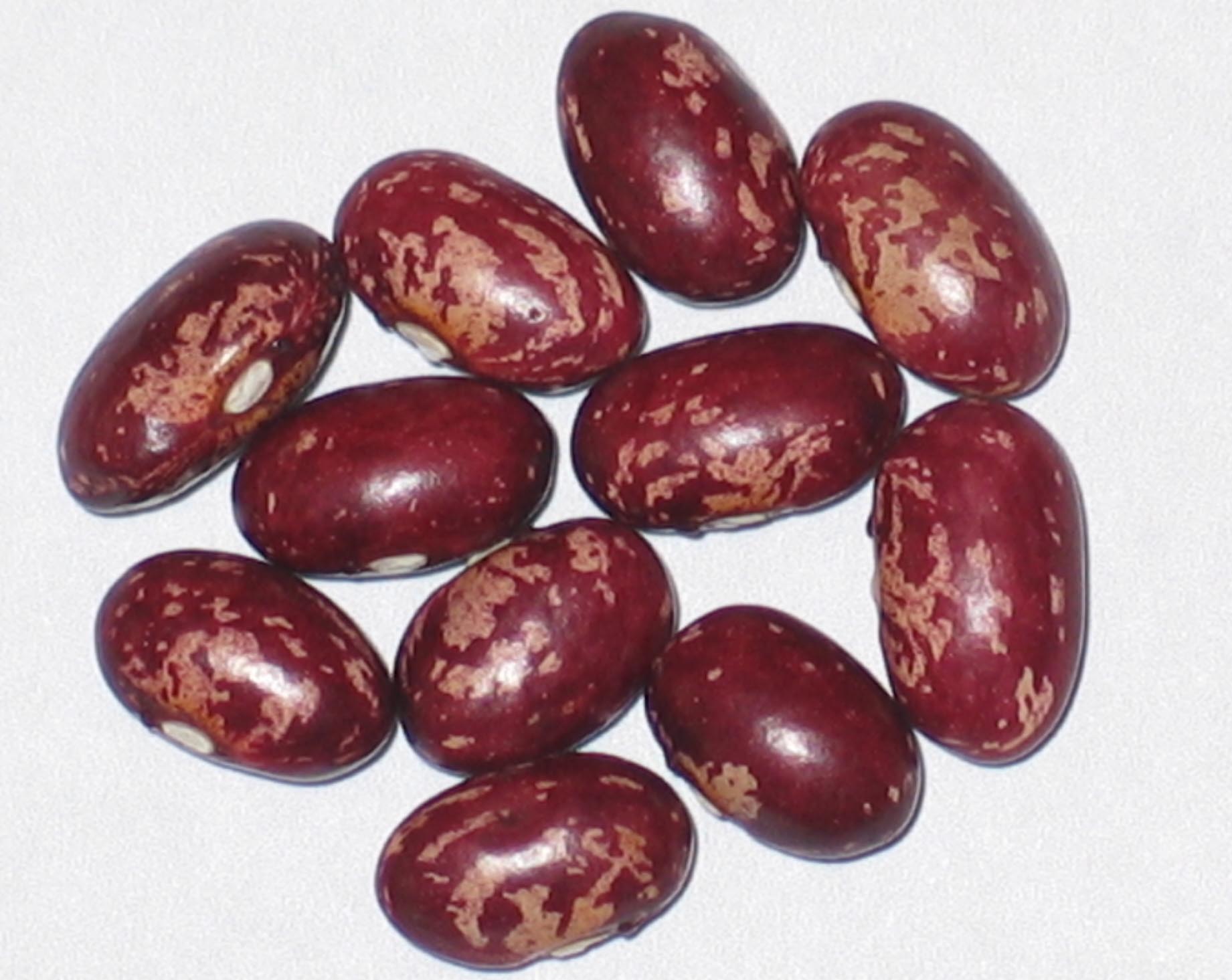
Early Warwick
Packet Size 30 Seeds $5.00
Early Warwick is a bush dry bean that matures in 75 days, known for its stocky plants and heavy yields. This variety is also tolerant of cool weather, making it a versatile choice for various climates. Its history dates back to before 1890 in Warwick, England, and the seeds were acquired from a gardening friend in Derby, England, emphasizing its rich heritage and the importance of preserving such varieties.
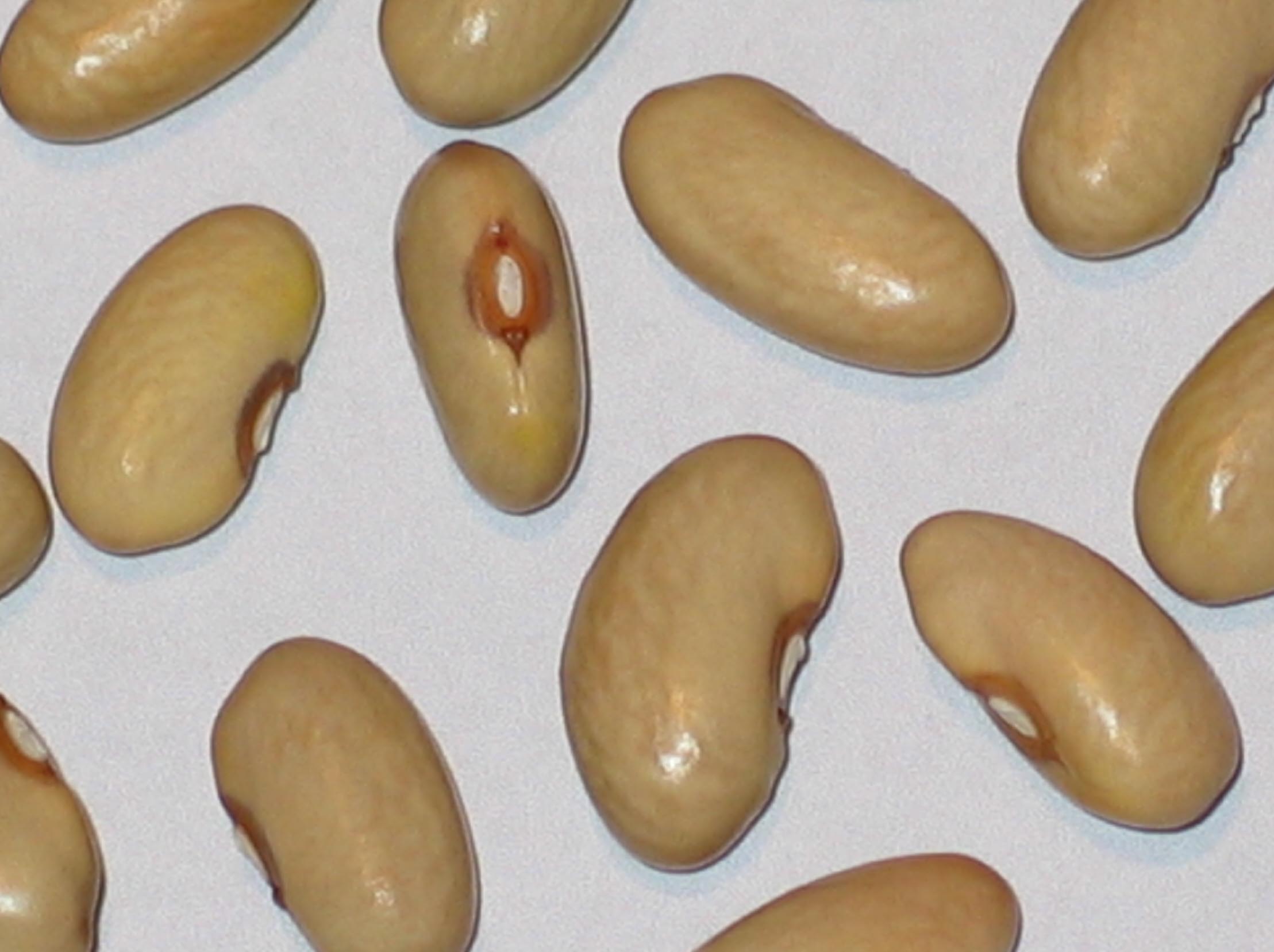
Early Yellow Six Weeks
Packet Size 25 Seeds $5.00
Early Yellow Six Weeks is a bush snap bean that produces green snap pods in approximately 50 days, with a total of 90 days to reach dry pods. This very old variety dates back to the 1700s and is noted in publications from the 1860s, where it was already regarded as a longstanding cultivar with a history of at least a century, underscoring its significance in heirloom gardening and agricultural heritage.
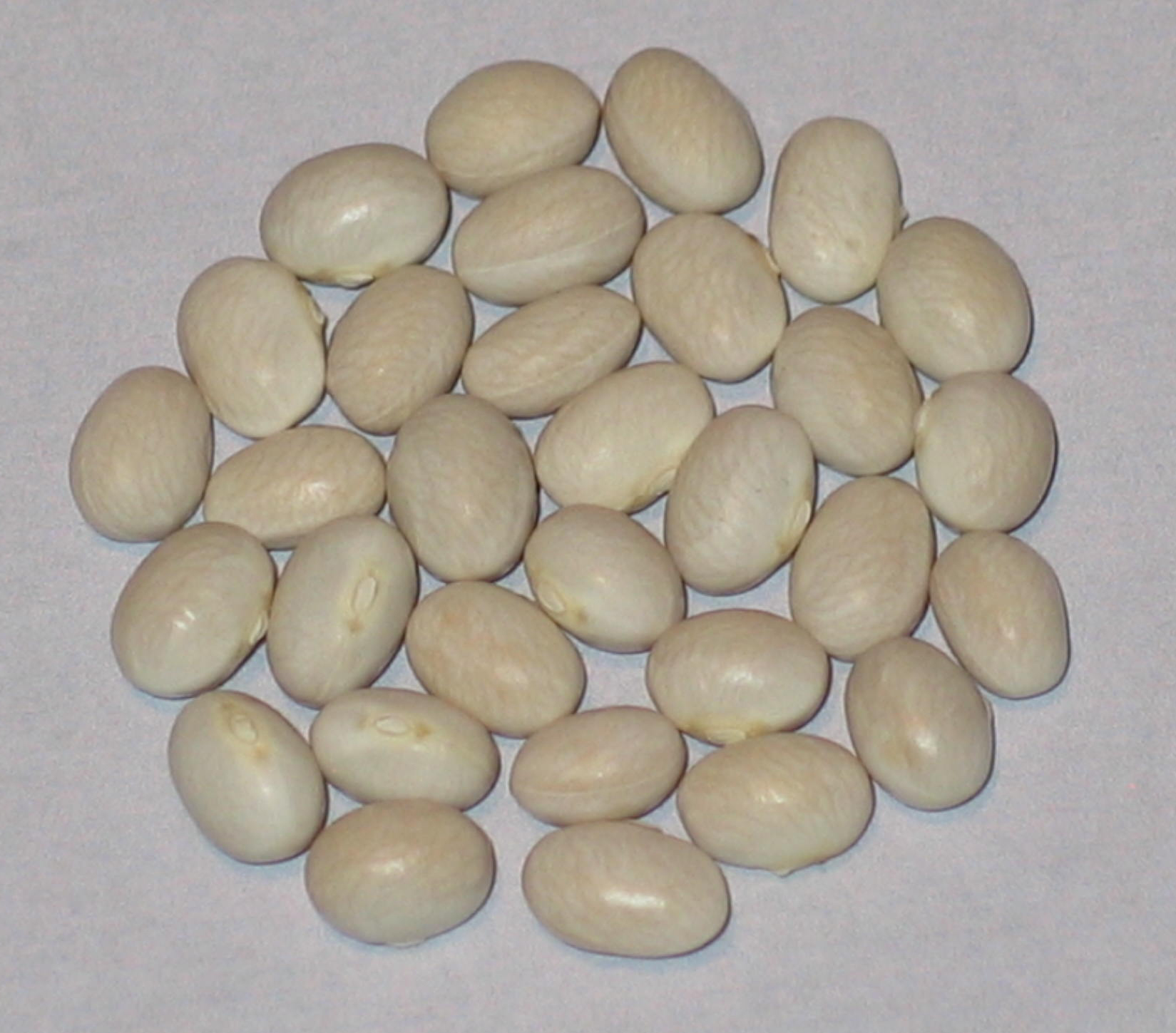
Eden Lake Pearls
Packet Size 25 Seeds $5.00
Eden Lake Pearls is a bush dry bean that takes 80 to 90 days to produce the first dry seeds. Developed by the late Robert Lobitz, this variety features rounded white beans that are larger than traditional Navy beans, making it a unique addition to heirloom collections and valued for both its size and flavor.
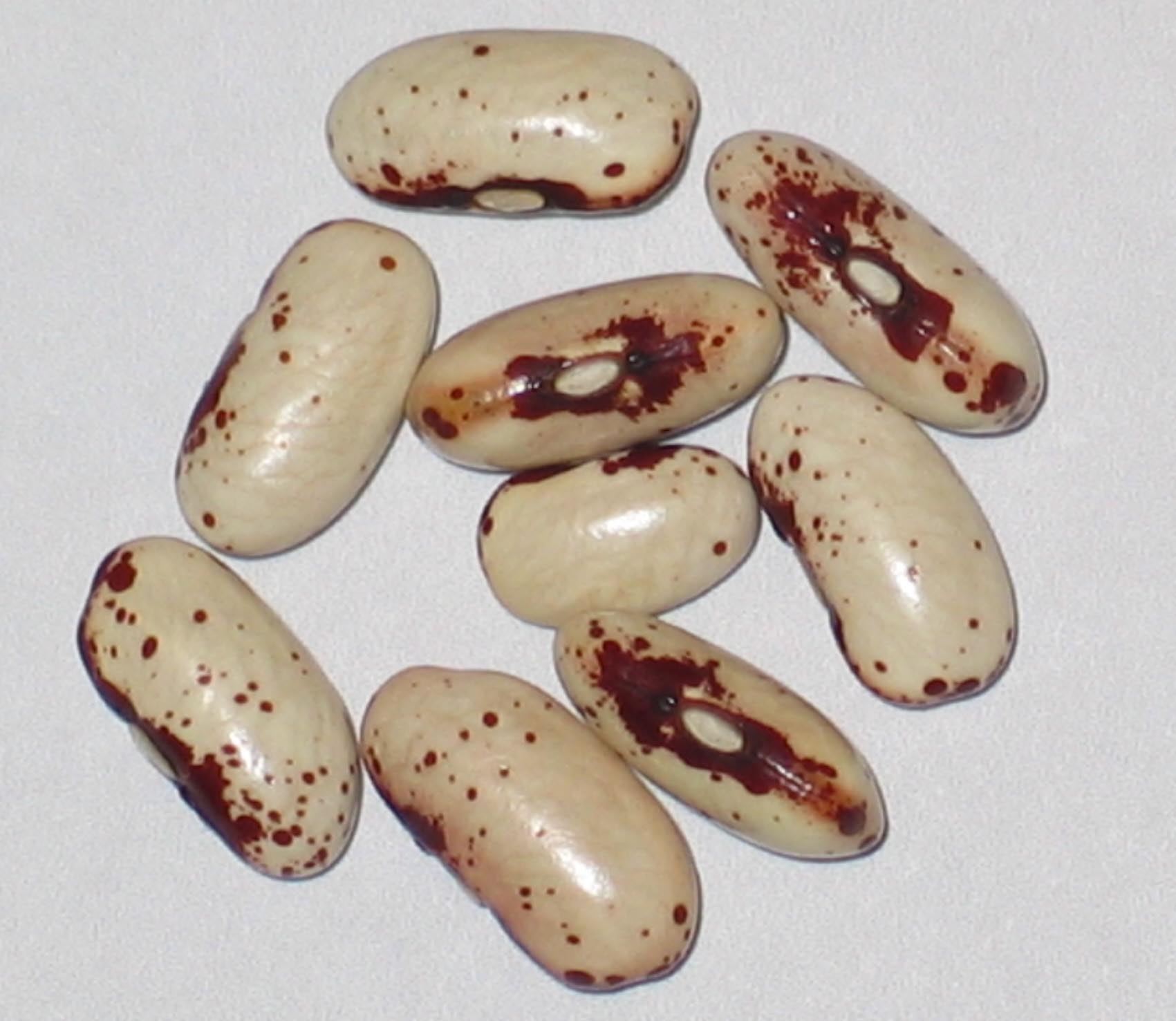
Eden Prairie
Packet Size 35 Seeds $5.00
Eden Prairie is a bush snap bean that matures in 80 to 90 days, reaching the beginning of its dry seed stage. Created by the late Robert Lobitz, this distinctive variety is characterized by its nearly soldier-like appearance around the eye, adorned with very fine red specks on a white background, adding visual appeal and interest to any bean collection.
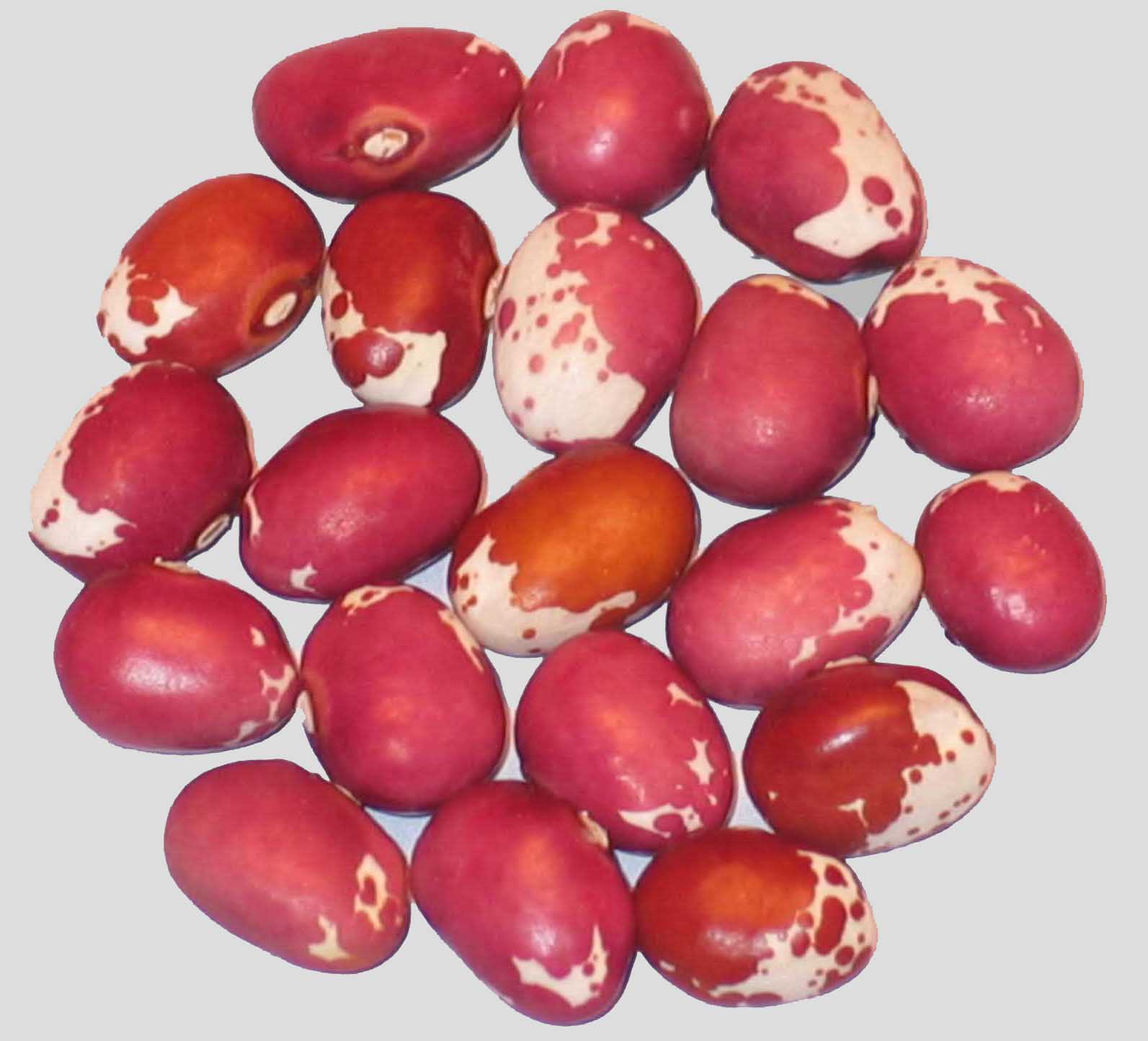
Eden Valley
Packet Size 25 Seeds $5.00
Eden Valley is a productive bush dry bean variety, featuring 19-inch tall plants that produce 4-inch smooth, round pods that are easy to shell by hand. With a pink blossom, this bean takes about 70 days to yield its first dry pods, which continue to mature sequentially over three weeks. Originating as a segregation from a packet of mixed round black, white, and brown beans received from Ron Thuma in 2015. I christened Eden Valley with this name in 2020, Eden Valley represents a cherished legacy of Robert Lobitz that continues to thrive today.